How to Write the AP Lang Rhetorical Analysis Essay (With Example)
November 27, 2023

Feeling intimidated by the AP Lang Rhetorical Analysis Essay? We’re here to help demystify. Whether you’re cramming for the AP Lang exam right now or planning to take the test down the road, we’ve got crucial rubric information, helpful tips, and an essay example to prepare you for the big day. This post will cover 1) What is the AP Lang Rhetorical Analysis Essay? 2) AP Lang Rhetorical Analysis Rubric 3) AP Lang Rhetorical Analysis: Sample Prompt 4) AP Lang Rhetorical Analysis Essay Example 5)AP Lang Rhetorical Analysis Essay Example: Why It Works

What is the AP Lang Rhetorical Analysis Essay?
The AP Lang Rhetorical Analysis Essay is one of three essays included in the written portion of the AP English Exam. The full AP English Exam is 3 hours and 15 minutes long, with the first 60 minutes dedicated to multiple-choice questions. Once you complete the multiple-choice section, you move on to three equally weighted essays that ask you to synthesize, analyze, and interpret texts and develop well-reasoned arguments. The three essays include:
Synthesis essay: You’ll review various pieces of evidence and then write an essay that synthesizes (aka combines and interprets) the evidence and presents a clear argument. Read our write up on How to Write the AP Lang Synthesis Essay here.
Argumentative essay: You’ll take a stance on a specific topic and argue your case.
Rhetorical essay: You’ll read a provided passage, then analyze the author’s rhetorical choices and develop an argument that explains why the author made those rhetorical choices.
AP Lang Rhetorical Analysis Rubric
The AP Lang Rhetorical Analysis Essay is graded on just 3 rubric categories: Thesis, Evidence and Commentary, and Sophistication . At a glance, the rubric categories may seem vague, but AP exam graders are actually looking for very particular things in each category. We’ll break it down with dos and don’ts for each rubric category:
Thesis (0-1 point)
There’s nothing nebulous when it comes to grading AP Lang Rhetorical Analysis Essay thesis. You either have one or you don’t. Including a thesis gets you one point closer to a high score and leaving it out means you miss out on one crucial point. So, what makes a thesis that counts?
- Make sure your thesis argues something about the author’s rhetorical choices. Making an argument means taking a risk and offering your own interpretation of the provided text. This is an argument that someone else might disagree with.
- A good test to see if you have a thesis that makes an argument. In your head, add the phrase “I think that…” to the beginning of your thesis. If what follows doesn’t logically flow after that phrase (aka if what follows isn’t something you and only you think), it’s likely you’re not making an argument.
- Avoid a thesis that merely restates the prompt.
- Avoid a thesis that summarizes the text but does not make an argument.
Evidence and Commentary (0-4 points)
This rubric category is graded on a scale of 0-4 where 4 is the highest grade. Per the AP Lang Rhetorical Analysis rubric, to get a 4, you’ll want to:
- Include lots of specific evidence from the text. There is no set golden number of quotes to include, but you’ll want to make sure you’re incorporating more than a couple pieces of evidence that support your argument about the author’s rhetorical choices.
- Make sure you include more than one type of evidence, too. Let’s say you’re working on your essay and have gathered examples of alliteration to include as supporting evidence. That’s just one type of rhetorical choice, and it’s hard to make a credible argument if you’re only looking at one type of evidence. To fix that issue, reread the text again looking for patterns in word choice and syntax, meaningful figurative language and imagery, literary devices, and other rhetorical choices, looking for additional types of evidence to support your argument.
- After you include evidence, offer your own interpretation and explain how this evidence proves the point you make in your thesis.
- Don’t summarize or speak generally about the author and the text. Everything you write must be backed up with evidence.
- Don’t let quotes speak for themselves. After every piece of evidence you include, make sure to explain your interpretation. Also, connect the evidence to your overarching argument.
Sophistication (0-1 point)
In this case, sophistication isn’t about how many fancy vocabulary words or how many semicolons you use. According to College Board , one point can be awarded to AP Lang Rhetorical Analysis essays that “demonstrate sophistication of thought and/or a complex understanding of the rhetorical situation” in any of these three ways:
- Explaining the significance or relevance of the writer’s rhetorical choices.
- Explaining the purpose or function of the passage’s complexities or tensions.
- Employing a style that is consistently vivid and persuasive.
Note that you don’t have to achieve all three to earn your sophistication point. A good way to think of this rubric category is to consider it a bonus point that you can earn for going above and beyond in depth of analysis or by writing an especially persuasive, clear, and well-structured essay. In order to earn this point, you’ll need to first do a good job with your thesis, evidence, and commentary.
- Focus on nailing an argumentative thesis and multiple types of evidence. Getting these fundamentals of your essay right will set you up for achieving depth of analysis.
- Explain how each piece of evidence connects to your thesis.
- Spend a minute outlining your essay before you begin to ensure your essay flows in a clear and cohesive way.
- Steer clear of generalizations about the author or text.
- Don’t include arguments you can’t prove with evidence from the text.
- Avoid complex sentences and fancy vocabulary words unless you use them often. Long, clunky sentences with imprecisely used words are hard to follow.
AP Lang Rhetorical Analysis: Sample Prompt
The sample prompt below is published online by College Board and is a real example from the 2021 AP Exam. The prompt provides background context, essay instructions, and the text you need to analyze. For sake of space, we’ve included the text as an image you can click to read. After the prompt, we provide a sample high scoring essay and then explain why this AP Lang Rhetorical Analysis essay example works.
Suggested time—40 minutes.
(This question counts as one-third of the total essay section score.)
On February 27, 2013, while in office, former president Barack Obama delivered the following address dedicating the Rosa Parks statue in the National Statuary Hall of the United States Capitol building. Rosa Parks was an African American civil rights activist who was arrested in 1955 for refusing to give up her seat on a segregated bus in Montgomery, Alabama. Read the passage carefully. Write an essay that analyzes the rhetorical choices Obama makes to convey his message.
In your response you should do the following:
- Respond to the prompt with a thesis that analyzes the writer’s rhetorical choices.
- Select and use evidence to support your line of reasoning.
- Explain how the evidence supports your line of reasoning.
- Demonstrate an understanding of the rhetorical situation.
- Use appropriate grammar and punctuation in communicating your argument.
AP Lang Rhetorical Analysis Essay Example
In his speech delivered in 2013 at the dedication of Rosa Park’s statue, President Barack Obama acknowledges everything that Parks’ activism made possible in the United States. Telling the story of Parks’ life and achievements, Obama highlights the fact that Parks was a regular person whose actions accomplished enormous change during the civil rights era. Through the use of diction that portrays Parks as quiet and demure, long lists that emphasize the extent of her impacts, and Biblical references, Obama suggests that all of us are capable of achieving greater good, just as Parks did.
Although it might be a surprising way to start to his dedication, Obama begins his speech by telling us who Parks was not: “Rosa Parks held no elected office. She possessed no fortune” he explains in lines 1-2. Later, when he tells the story of the bus driver who threatened to have Parks arrested when she refused to get off the bus, he explains that Parks “simply replied, ‘You may do that’” (lines 22-23). Right away, he establishes that Parks was a regular person who did not hold a seat of power. Her protest on the bus was not part of a larger plan, it was a simple response. By emphasizing that Parks was not powerful, wealthy, or loud spoken, he implies that Parks’ style of activism is an everyday practice that all of us can aspire to.
AP Lang Rhetorical Analysis Essay Example (Continued)
Even though Obama portrays Parks as a demure person whose protest came “simply” and naturally, he shows the importance of her activism through long lists of ripple effects. When Parks challenged her arrest, Obama explains, Martin Luther King, Jr. stood with her and “so did thousands of Montgomery, Alabama commuters” (lines 27-28). They began a boycott that included “teachers and laborers, clergy and domestics, through rain and cold and sweltering heat, day after day, week after week, month after month, walking miles if they had to…” (lines 28-31). In this section of the speech, Obama’s sentences grow longer and he uses lists to show that Parks’ small action impacted and inspired many others to fight for change. Further, listing out how many days, weeks, and months the boycott lasted shows how Parks’ single act of protest sparked a much longer push for change.
To further illustrate Parks’ impact, Obama incorporates Biblical references that emphasize the importance of “that single moment on the bus” (lines 57-58). In lines 33-35, Obama explains that Parks and the other protestors are “driven by a solemn determination to affirm their God-given dignity” and he also compares their victory to the fall the “ancient walls of Jericho” (line 43). By of including these Biblical references, Obama suggests that Parks’ action on the bus did more than correct personal or political wrongs; it also corrected moral and spiritual wrongs. Although Parks had no political power or fortune, she was able to restore a moral balance in our world.
Toward the end of the speech, Obama states that change happens “not mainly through the exploits of the famous and the powerful, but through the countless acts of often anonymous courage and kindness” (lines 78-81). Through carefully chosen diction that portrays her as a quiet, regular person and through lists and Biblical references that highlight the huge impacts of her action, Obama illustrates exactly this point. He wants us to see that, just like Parks, the small and meek can change the world for the better.
AP Lang Rhetorical Analysis Essay Example: Why It Works
We would give the AP Lang Rhetorical Analysis essay above a score of 6 out of 6 because it fully satisfies the essay’s 3 rubric categories: Thesis, Evidence and Commentary, and Sophistication . Let’s break down what this student did:
The thesis of this essay appears in the last line of the first paragraph:
“ Through the use of diction that portrays Parks as quiet and demure, long lists that emphasize the extent of her impacts, and Biblical references, Obama suggests that all of us are capable of achieving greater good, just as Parks did .”
This student’s thesis works because they make a clear argument about Obama’s rhetorical choices. They 1) list the rhetorical choices that will be analyzed in the rest of the essay (the italicized text above) and 2) include an argument someone else might disagree with (the bolded text above).
Evidence and Commentary:
This student includes substantial evidence and commentary. Things they do right, per the AP Lang Rhetorical Analysis rubric:
- They include lots of specific evidence from the text in the form of quotes.
- They incorporate 3 different types of evidence (diction, long lists, Biblical references).
- After including evidence, they offer an interpretation of what the evidence means and explain how the evidence contributes to their overarching argument (aka their thesis).
Sophistication
This essay achieves sophistication according to the AP Lang Rhetorical Analysis essay rubric in a few key ways:
- This student provides an introduction that flows naturally into the topic their essay will discuss. Before they get to their thesis, they tell us that Obama portrays Parks as a “regular person” setting up their main argument: Obama wants all regular people to aspire to do good in the world just as Rosa Parks did.
- They organize evidence and commentary in a clear and cohesive way. Each body paragraph focuses on just one type of evidence.
- They explain how their evidence is significant. In the final sentence of each body paragraph, they draw a connection back to the overarching argument presented in the thesis.
- All their evidence supports the argument presented in their thesis. There is no extraneous evidence or misleading detail.
- They consider nuances in the text. Rather than taking the text at face value, they consider what Obama’s rhetorical choices imply and offer their own unique interpretation of those implications.
- In their final paragraph, they come full circle, reiterate their thesis, and explain what Obama’s rhetorical choices communicate to readers.
- Their sentences are clear and easy to read. There are no grammar errors or misused words.
AP Lang Rhetorical Analysis Essay—More Resources
Looking for more tips to help your master your AP Lang Rhetorical Analysis Essay? Brush up on 20 Rhetorical Devices High School Students Should Know and read our Tips for Improving Reading Comprehension . If you’re ready to start studying for another part of the AP English Exam, find more expert tips in our How to Write the AP Lang Synthesis blog post.
Considering what other AP classes to take? Read up on the Hardest AP Classes .
- High School Success

Christina Wood
Christina Wood holds a BA in Literature & Writing from UC San Diego, an MFA in Creative Writing from Washington University in St. Louis, and is currently a Doctoral Candidate in English at the University of Georgia, where she teaches creative writing and first-year composition courses. Christina has published fiction and nonfiction in numerous publications, including The Paris Review , McSweeney’s , Granta , Virginia Quarterly Review , The Sewanee Review , Mississippi Review , and Puerto del Sol , among others. Her story “The Astronaut” won the 2018 Shirley Jackson Award for short fiction and received a “Distinguished Stories” mention in the 2019 Best American Short Stories anthology.
- 2-Year Colleges
- Application Strategies
- Big Picture
- Career & Personality Assessment
- College Essay
- College Search/Knowledge
- College Success
- Costs & Financial Aid
- Dental School Admissions
- Extracurricular Activities
- Graduate School Admissions
- High Schools
- Law School Admissions
- Medical School Admissions
- Navigating the Admissions Process
- Online Learning
- Private High School Spotlight
- Summer Program Spotlight
- Summer Programs
- Test Prep Provider Spotlight

“Innovative and invaluable…use this book as your college lifeline.”
— Lynn O'Shaughnessy
Nationally Recognized College Expert
College Planning in Your Inbox
Join our information-packed monthly newsletter.
Sign Up Now
What are your chances of acceptance?
Calculate for all schools, your chance of acceptance.
Your chancing factors
Extracurriculars.
How to Write the AP Lang Rhetorical Essay
Do you know how to improve your profile for college applications.
See how your profile ranks among thousands of other students using CollegeVine. Calculate your chances at your dream schools and learn what areas you need to improve right now — it only takes 3 minutes and it's 100% free.
Show me what areas I need to improve
What’s Covered:
What is the ap lang rhetorical essay, tips for writing the ap lang rhetorical essay.
- AP Lang Rhetorical Essay Example
How Will AP Scores Affect College Chances?
The AP English Language Exam is one of the most common AP exams you can take. However, the average score on the exam in 2020 was a 2.96 out of 5. While this may seem a bit low, it is important to note that over 550,000 students take the exam annually. With some preparation and knowing how to study, it is totally possible to do well on this AP exam.
The AP Lang Rhetorical Essay is one section of the AP English Language Exam. The exam itself is 3 hours and 15 minutes long, and is broken into two sections. The first part of the exam is a 60 minute, 45-question multiple-choice section. The questions on this part of the exam will test your ability to read a passage and then interpret its meaning, style, and overall themes. After the multiple-choice section, there is a section lasting 2 hours and 15 minutes with three “free response” essays. This includes the synthesis essay, the rhetorical analysis essay, and the argument essay.
- In the synthesis essay , you will have to develop an argument using pieces of evidence provided to you.
- The argumentative essay will have you pick a side in a debate and argue for or against it.
- The rhetorical essay requires that you discuss how an author’s written passage contributes to a greater meaning or theme.
The rhetorical essay is perhaps the most unique of all AP Lang exam essays because it requires the test taker to analyze and interpret the deeper meanings of the passage and connect them to the author’s writing style and writing syntax in only 40 minutes. This essay can be the trickiest because it requires you to have knowledge of rhetorical strategies and then apply them to a passage you’ve never seen before.
1. Outline Your Essay Before Writing
One of the most important parts of the AP Lang essays is structuring your essay so that it makes sense to the reader. This is just as important as having good content. For this essay in particular, you’ll want to read the passage first and write a brief outline of your points before you begin the essay. This is because you will want to write the essay using the passage chronologically, which will be discussed in detail below.
2. Understand Rhetorical Strategies
If you feel like you don’t know where to start as you prepare to study for the rhetorical essay portion of the exam, you aren’t alone. It is imperative that you have a grasp on what rhetorical strategies are and how you can use them in your essay. One definition of rhetoric is “language carefully chosen and arranged for maximum effect.” This can include types of figurative language (metaphor, simile, personification, pun, irony, etc.) elements of syntax (parallelism, juxtaposition, anthesis, anaphora, etc), logical fallacies, or persuasive appeals. Overall, there are many elements that you can analyze in an essay and having a good grasp on them through practice and memorization is important.
3. Keep the Essay Well Structured
Even if you understand the various rhetorical strategies you can use, where do you begin? First of all, you’ll want to write a strong introduction that outlines the purpose of the piece. At the end of this introduction, you will write a thesis statement that encapsulates all the rhetorical strategies you discuss. Perhaps these are style elements, tone, or syntax. Be sure to be specific as you list these.
Next, you will create your body paragraphs. As you discuss the rhetorical elements in the piece and tie them back to the work’s meanings, be sure to discuss the points in chronological order. You don’t have to discuss every single strategy, but just pick the ones that are most important. Be sure to cite the line where you found the example. At the end of the essay, write a short conclusion that summarizes the major points above.
4. Be Sure to Explain Your Examples
As you write the essay, don’t just list out your examples and say something like “this is an example of ethos, logos, pathos.” Instead, analyze how the example shows that rhetoric device and how it helps the author further their argument. As you write the rhetorical essay, you’ll want to be as specific and detail-focused as possible.

Discover your chances at hundreds of schools
Our free chancing engine takes into account your history, background, test scores, and extracurricular activities to show you your real chances of admission—and how to improve them.
AP Lang Rhetorical Analysis Essay Example
Below is a prompt and example for a rhetorical essay, along with its score and what the writer did well and could have improved:
The passage below is an excerpt from “On the Want of Money,” an essay written by nineteenth-century author William Hazlitt. Read the passage carefully. Then write an essay in which you analyze the rhetorical strategies Hazlitt uses to develop his position about money.
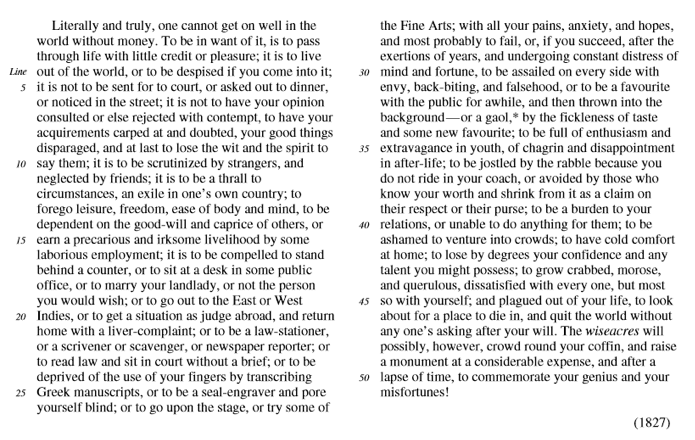
Student essay example:
In his essay, Hazlitt develops his position on money through careful use of adjectives and verbs, hypothetical situations, and images. His examples serve to impress upon the reader the highly negative consequences of being in “want of money.”
Hazlitt’s word choice in his opening phrase provides an example of his technique in the rest of the essay. It is not necessary to follow “literally” with “truly” yet his repetition of the same ideas emphasizes his point. In his next sentence, one that lasts forty-six lines, Hazlitt condignly repeats similar ideas, beating into his audience the necessity of having money in this world. The parallelism throughout that one long sentence, “it is not to be sent for to court, or asked out to dinner…it is not to have your own opinion consulted or sees rejected with contempt..” ties the many different situations Haziltt gives together. What could have become a tedious spiel instead becomes a melodious recitation, each example reminding you of one before it, either because of the similarities in structure or content. Hazlitt addresses many different negative effects of not having money but manages to tie them together with his rhetorical strategies.
The diction of the passage fully relays Hazlitt’s position about money. In every example he gives a negative situation but in most emphasizes the terrible circumstance with strong negative adjectives or verbs. “Rejected,” “contempt,” “disparaged,” “scrutinized,” “irksome,” “deprived,” “assailed” “chagrin;” the endless repetition of such discouragement shows how empathetically Hazlitt believes money is a requisite for a happy life. Even the irony of the last sentences is negative, conveying the utter hopelessness of one without money. Through one may have none in life, pitiless men will proceed to mock one’s circumstances, “at a considerable expense” after death!
In having as the body of his essay one long sentence, Hazlitt creates a flow that speeds the passage along, hardly giving the reader time to absorb one idea before another is thrown at him. The unceasing flow is synonymous with Hazlitt’s view of the life of a person without money: he will be “jostled” through life, unable to stop and appreciate the beauty around him or to take time for his own leisure.
The score on this essay was a 6 out of 6. This essay started out very strong as the student had a concrete thesis statement explaining the strategies that Hazlitt used to develop his position on money as well as Hazlitt’s belief on the topic. In the thesis statement, the student points out that adjectives, verbs, hypothetical situations, and images help prove Hazlitt’s point that wanting money can be problematic.
Next, the student broke down their points into three main subsections related to their thesis. More specifically, the student first discusses word choice of repetition and parallelism. When the student discusses these strategies, they list evidence in the paragraph that can be found chronologically in Hazlitt’s essay. The next paragraph is about diction, and the student used specific adjectives and verbs that support this idea. In the last paragraph, the student emphasized how the speed and flow of the essay helped describe Hazlitt’s viewpoint on life. This last concluding sentence is particularly thoughtful, as it goes beyond the explicit points made in the essay and discusses the style and tone of the writing.
It is important to remember that in some ways, the rhetorical essay is also an argumentative essay, as the student must prove how certain rhetorical strategies are used and their significance in the essay. The student even discussed the irony of the paragraph, which is not explicit in the passage.
Overall, this student did an excellent job organizing and structuring the essay and did a nice job using evidence to prove their points.
Now that you’ve learned about the AP Lang rhetorical essay, you may be wondering how your AP scores impact your chances of admission. In fact, your AP scores have relatively little impact on your admissions decision , and your course rigor has much more weight in the application process.
If you’d like to know your chances of admission, be sure to check out our chancing calculator! This tool takes into account your classes, extracurriculars, demographic information, and test scores to understand your chances at admission at over 600 schools. Best of all, it is completely free!

Related CollegeVine Blog Posts

Find what you need to study
Rhetorical Analysis Essay How-To
7 min read • november 18, 2021
Kathryn Howard
What is the Rhetorical Analysis Essay?
According to the college board:.
“The rhetorical analysis free-response essay question presents students with a passage of nonfiction prose of approximately 600 to 800 words. Students are asked to write an essay that analyzes the writer’s rhetorical choices . This question assesses students’ ability to do the following:
Respond to the prompt with a thesis that analyzes the writer’s rhetorical choices .
Select and use evidence to support your line of reasoning .
Explain how the evidence supports your line of reasoning .
Demonstrate an understanding of the rhetorical situation .
Use appropriate grammar and punctuation in communicating your argument."
Essentially, you are being asked to analyze someone’s writing and what strategies they used to help them achieve their purpose.
Rhetorical Analysis Rubric for Scoring
The rhetorical analysis frq is out of 6 points.

To get this point you need to clearly write a defensible thesis about the rhetorical choices the author makes. Do not take a stance on the argument the author is making if he/she is making one. You are only talking about rhetorical strategies.
🎥 Watch: AP Language - How to Find Rhetorical Strategies
Evidence and Commentary (4 points)
To get the four points you need to not only present evidence but explain why it supports your thesis and how it contributes to the author’s message.
Sophistication (1 point)
To get to this point you have to demonstrate a complex understanding of both what that purpose was, and how the rhetorical analysis devices aided the author’s purpose.
There are a few ways that you can earn the sophistication point :
Explaining the significance or relevance of the writer’s rhetorical choices (given the rhetorical situation ).
Explaining a purpose or function of the passage’s complexities or tensions.
Employing a style that is consistently vivid and persuasive.
You have 40 minutes to complete the rhetorical analysis essay for AP Lang:
12 minutes: Read the text and plan out your essay. (TOBI)
6 minutes: Write your introduction paragraph.
18 minutes: Write 2-3 body paragraphs.
2 minutes: Write a quick conclusion.
2 minutes: Proofread and revise your essay.
🎥 Watch: AP Language - Rhetorical Analysis Organization and Timing

How to Maximize Your Time
Outline your rhetorical analysis essay before writing! A great tool for this is a TOBI:
TOBI stands for thesis , outline , and big idea.
TOBI Outline
BI -Big Idea
Here is an example of how to use TOBI given a rhetorical analysis prompt:

From CollegeBoard AP Lang 2017 Exam, FRQ Question 2
T: Luce uses many rhetorical strategies including pathos , antithesis , and a humorous tone to soften up her audience before introducing her true reasons for being there.
- Pathos Appeal
(“There is no audience more forgiving”)
- Antithesis
(“I am happy, I am less happy”)
- Humorous tone
(“consequently, no audience is more forgiving, I hope”)
BI: Today, just like for Luce, it is very difficult to give criticism to your peers.
Note: It is a good idea to make the TOBI about the size of your hand to make sure you don’t spend too much of your precious essay writing time on it.
What if I can't find any rhetorical devices that I recognize?
You can always go back and rely on tone as every piece of literature has one, even if it is just informative. If you know what they are doing, but not the name of the term, you can still just describe it and get the points. Additionally, make sure that you are familiar with all the rhetorical devices that are a part of AP Lang!
🎥 Watch: AP Language - Reading with an Analytical Mind
If it’s not an argumentative essay, what do you put in your thesis?
You state the most important writing choices the author made in order to impact the audience of the work.
Other Tips and Tricks
The big idea should show how this prompt applies to today. This will help you write your conclusion. In most language arts classes they teach you to simply restate your points, but not in AP Lang!
The first thing you are going to want to do is carefully read through and highlight any strategies you see.
Even if TOBI doesn’t work for you, it is a good idea to outline the essay. Even though it takes time, it will end up saving you time in the end because it gives you direction.
One of the most useful tools for the introduction is something called Soapstones. In this intro you are introducing the S peaker, O ccasion, A udience, P urpose, S ubject, T one, and S tyle. (Keep in mind: You do not need to include EVERY ONE). But, most successful essays include a few of them.
DON’T SKIM! It will only hurt you in the long run, even if you think it might be saving you time.
If you need to, review strategy names, but if you don’t remember, do your best to describe what is going on and how the author is using it.

Rhetorical Analysis Example Essay Prompt
The speech below was given at the site of the battle of Gettysburg by president Abraham Lincoln. Lincoln went on to describe his desire to save the union. Read the passage carefully and then in a well-developed essay, analyze the writing choices Lincoln makes to share his message with others. Support your analysis of his rhetoric with specific references from the text.
“Four score and seven years ago our fathers brought forth on this continent a new nation, conceived in Liberty and dedicated to the proposition that all men are created equal. Now we are engaged in a great civil war, testing whether that nation or any nation so conceived and so dedicated, can long endure. We are met on a great battle-field of that war. We have come to dedicate a portion of that field, as a final resting place for those who here gave their lives that that nation might live. It is altogether fitting and proper that we should do this. But, in a larger sense, we can not dedicate—we can not consecrate—we can not hallow—this ground. The brave men, living and dead, who struggled here, have consecrated it, far above our poor power to add or detract. The world will little note, nor long remember what we say here, but it can never forget what they did here. It is for us the living, rather, to be dedicated here to the unfinished work which they who fought here have thus far so nobly advanced. It is rather for us to be here dedicated to the great task remaining before us—that from these honored dead we take increased devotion to that cause for which they gave the last full measure of devotion—that we here highly resolve that these dead shall not have died in vain—that this nation, under God, shall have a new birth of freedom—and that government of the people, by the people, for the people, shall not perish from the earth.”
Key Terms to Review ( 20 )
Complex Understanding
Defendable Thesis
FRQ (Free-Response Question)
Grammar and Punctuation
Humorous Tone
Line of Reasoning
Passage's Complexities or Tensions
Pathos Appeal
Rhetorical Analysis Essay
Rhetorical Analysis Rubric
Rhetorical Choices
Rhetorical Situation
Significance or Relevance
Sophistication Point
TOBI (Thesis, Outline, Big Idea)
Vivid and Persuasive Style
Writer's Rhetorical Choices

Stay Connected
© 2024 Fiveable Inc. All rights reserved.
AP® and SAT® are trademarks registered by the College Board, which is not affiliated with, and does not endorse this website.
AP English Language and Composition: Sample Rhetorical Analysis and Synthesis Questions
August 21, 2021.
The Rhetorical Analysis and Synthesis Essays are two of the three essays you’ll need to write as part of the AP English Language and Composition Exam . Read on for a sample of each, as well as tips for how to answer them.
AP English Language and Composition: Sample Rhetorical Analysis Question
Read the following passage published back in 1967 by The New York Times. Then write an essay in which you analyze how the structure of the passage and the use of language help convey the writer’s views.
Sample Question Instructions:
- Respond to the prompt with a thesis that may establish a line of reasoning.
- Select and use evidence to develop and support the line of reasoning.
- Explain the relationship between the evidence and the thesis.
- Demonstrate an understanding of the rhetorical situation.
- Use appropriate grammar and punctuation in communicating the argument.
Americans and Western Europeans, in their sensitivity to lingering problems around them, tend to make science and progress their scapegoats. There is a belief that progress has precipitated widespread unhappiness, anxieties, and other social and emotional problems. Science is viewed as a cold mechanical discipline having nothing to do with human warmth and the human spirit.
But to many of us from the nonscientific East, science does not have such repugnant associations. We are not afraid of it, nor are we disappointed by it. We know all too painfully that our social and emotional problems festered long before the age of technology. To us, science is warm and reassuring. It promises hope. It is helping us at long last gain some control over our persecutory environments, alleviating age-old problems—not only physical but also, and especially, problems of the spirit.
Shiraz, for example, a city in southern Iran, has long been renowned for its rose gardens and nightingales; its poets, Sadi and Hafiz; and its mystical, ascetic philosophy, Sufism. Much poetry has been written in glorification of the spiritual attributes of this oasis city. And to be sure, Shiraz is a green, picturesque town, with a quaint bazaar and refreshing gardens. But in this “romantic” city thousands of emotionally disturbed and mentally retarded men, women, and children were, until recently, kept in chains in stifling prison cells and lunatic asylums.
Every now and again, some were dragged, screaming and pleading, to a courtyard and flogged for not behaving “normally.” But for the most part, they were made to sit against damp walls, their hands and feet locked in chains, and thus immobilized, without even a modicum of affection from their helpless families and friends, they sat for weeks and months and years—often all their lives. Pictures of these wretched men, women, and children can still be seen in this “city of poetry,” this “city with a spiritual way of life.”
It was only recently that a wealthy young Shirazi who, against the admonitions of his family, had studied psychology at the University of Tehran and foreign universities, returned to Shiraz and after considerable struggle with city officials succeeded in opening a psychiatric clinic, the first in those regions. After still more struggle, he arranged to have the emotionally disturbed and the mentally retarded transferred from prison to their homes, to hospitals, and to his clinic, where he and his staff now attend them.
They are fortunate. All over Asia and other backward areas, emotionally disturbed men and women are still incarcerated in these medieval dungeons called lunatic asylums. The cruel rejection and punishment are intended to teach them a lesson or help exorcise evil spirits.
The West, still bogged down in its ridiculous romanticism, would like to believe that emotional disturbances, dope addiction, delinquency are all modern problems brought on by technological progress, and that backward societies are too spiritual and beautiful to need the ministrations of science. But while the West can perhaps afford to think this way, the people of backward lands cannot. . . .
. . .The obstacles are awesome, the inertia too entrenched, the people’s suffering too anguished, their impatience too eruptive. Moreover, the total cultural reorganizations such as Asia and Africa are undergoing inevitably engender their own temporary dislocations and confusions. But their goals, the direction, remain constant. We are on the move, however awkwardly at first, to a saner, better world.
How to Answer the AP English Language and Composition Rhetorical Analysis Question
Go back to the original question, which asks you to analyze two features of the passage: (1) its structure, or organization, and (2) its language. The first aspect is fairly specific. As you read the passage, you need to observe what the author discusses first, second, third, and so on. Your essay should explain not only the order of ideas but the reasons the author may have chosen that order.
The second part of the question is more general. It invites you to analyze the use of language, which may include the author’s choice of words (diction), syntax (word order), figures of speech, use of evidence (such as statistics or logical reasoning), sentence structure, rhythm, sound, tone, or just about any other characteristics of style and rhetoric you choose.
Although the question directs you to write about two different aspects of the passage, the essay itself should be unified. That is, a good essay should not consist of, say, two disparate paragraphs, one exclusively devoted to structure and another to language. Rather, the essay should include material that shows the interrelationship of structure and language in the passage and how those elements contribute to the meaning and effect of the passage. This might be covered in a separate paragraph, or it could be woven into the overall fabric of the essay.
Before you begin to write, read the passage at least twice: once for an overview and once as you write your analysis. You may notice early on that the opening paragraph contains generalizations about Westerners’ concepts of science and progress. Then the author contrasts the Western view of science and progress with the Eastern view. Immediately, you see that the author, by using the first-person pronoun (as in “many of us”) is speaking from the perspective of an Easterner. Consequently, his discussion of Eastern views is apt to come across as more well-informed, more authoritative, perhaps more personal.
To support his position, the author gives an extended example—the city of Shiraz—to illustrate just how different the East is from the West. The description and vivid images of Shiraz memorably convey the idea that the “spiritual way of life” has a side to it that many Westerners don’t know about. This is the heart of the passage. The use of quotation marks around “romantic” and “city of poetry” is meant to point out the discrepancy between the idealized and real versions of Shiraz.
Nearing the end, the author reiterates his initial contrast between West and East, with emphasis on the East. The last paragraph offers a generalized statement about conditions in Asia and Africa, reminding the reader of the contrast made at the very beginning of the passage. Tying the end to the beginning of the passage creates a sense of unity—a desirable feature in any piece of writing.
AP English Language and Composition: Sample Argument Question
The following paragraph is adapted from Mirror for Man, a book written by anthropologist Clyde Kluckhorn in the middle of the twentieth century. Read the passage carefully. Then, write an essay that examines the extent to which the author’s characterization of the United States holds true today. Use appropriate evidence to support your argument.
Sample Question Instructions:
- Respond to the prompt with a thesis that may establish a line of reasoning.
- Select and use evidence to develop and support the line of reasoning.
- Explain the relationship between the evidence and the thesis.
- Demonstrate an understanding of the rhetorical situation.
Technology is valued as the very basis of the capitalistic system. Possession of gadgets is esteemed as a mark of success to the extent that persons are judged not by the integrity of their characters or by the originality of their minds but by what they seem to be—so far as can be measured by their wealth or by the variety and material goods which they display. “Success” is measured by their investments, homes, and lifestyles— not by their number of mistresses as in some cultures.
How to Answer the AP English Language and Composition Argument Question
Whether you agree, disagree, or have mixed views on the content of the passage, your job is to write a convincing argument that expresses your opinion. Initially, the word argument may suggest conflict or confrontation. But rest assured that your essay need not be combative. Rather, make it a calmly-reasoned explanation of your opinion on a debatable subject. Your goal is to persuade the reader that your opinion, supported by examples, facts, and other appropriate evidence, is correct.
If you have strong feelings about the topic, of course you should state them in your essay. But express them in calm, rational language. Be mindful that the essay should not be an emotional rant for or against the issue.
Consider first whether you agree with Kluckhorn’s definition of “success.” Is it, as Kluckhorn asserts, measured by income and material possessions? Or do you think that a more accurate standard of success in today’s America should be determined by less tangible criteria—things such as happiness or self-respect? Or do you stand somewhere in between those two extremes?
The actual position you take on the issue is less crucial than your ability to support it fully by drawing from your knowledge, background, experience, or observation. Regardless of your position, be sure to include more than one example. An argument that relies on a single example, however compelling, will fall flat.
In the prompt, Kluckhorn’s notion of success seems to refer broadly to American society. Resist responding in kind. That is, a short essay shouldn’t focus on the whole of society but only on an identifiable segment—perhaps college-educated professionals or urban, blue- collar Americans. The point is that a narrowly focused essay on a limited topic will always turn out better than one that tries to cover too much ground in just a few paragraphs.
AP Biology Resources
- About the AP Biology Exam
- Top AP Biology Exam Strategies
- Top 5 Study Topics and Tips for the AP Biology Exam
- AP Biology Short Free-Response Questions
- AP Biology Long Free-Response Questions
AP Psychology Resources
- What’s Tested on the AP Psychology Exam?
- Top 5 Study Tips for the AP Psychology Exam
- AP Psychology Key Terms
- Top AP Psychology Exam Multiple-Choice Question Tips
- Top AP Psychology Exam Free Response Questions Tips
- AP Psychology Sample Free Response Question
AP English Language and Composition Resources
- What’s Tested on the AP English Language and Composition Exam?
- Top 5 Tips for the AP English Language and Composition Exam
- Top Reading Techniques for the AP English Language and Composition Exam
- How to Answer the AP English Language and Composition Essay Questions
- AP English Language and Composition Exam Sample Essay Questions
- AP English Language and Composition Exam Multiple-Choice Questions
AP Human Geography Resources
- What’s Tested On the AP Human Geography Exam?
- AP Human Geography FAQs
- AP Human Geography Question Types and Strategies
- Top 5 Study Tips for the AP Human Geography Exam
FOLLOW ALONG ON SOCIAL

Choose Your Test
Sat / act prep online guides and tips, expert guide to the ap language and composition exam.
Advanced Placement (AP)

With the 2023 AP English Language and Composition exam happening on Tuesday, May 9, it's time to make sure that you're familiar with all aspects of the exam. In this article, I'll give a brief overview of the test, do a deeper dive on each of the sections, discuss how the exam is scored, offer some strategies for studying, and finally wrap up with some essential exam day tips.
Exam Overview
The AP Language and Composition exam tests your rhetorical and composition skills. Essentially, how do authors construct effective arguments in their writing? What tools do they use? How can you use those tools to craft effective writing yourself? That is the essence of rhetorical analysis.
The exam has two parts: the first section is an hour-long, 45 question multiple-choice section. It includes five sets of questions, each based on a passage or passages. In this section, there will be 23-25 rhetorical analysis questions which test your rhetorical skills. There will also be 20-22 writing questions which require you to consider revisions to the texts you're shown.
The second section is free response. It starts with a 15-minute reading period, and then you'll have 120 minutes to write three analytical essays:
- One essay where you synthesize several provided texts to create an argument
- One essay where you analyze a nonfiction passage for its rhetorical construction
- One essay where you create an original argument in response to a prompt.
You will have about 40 minutes to write each essay, but no one will prompt you to move from essay to essay—you can structure the 120 minutes as you wish.
In the next sections I'll go over each section of the exam more closely—first multiple choice, and then free response.
The AP English Language and Composition Multiple-Choice
The multiple-choice section tests you on two main areas. The first is how well you can read and understand nonfiction passages for their use of rhetorical devices and tools. The second is how well you can "think like a writer" and make revisions to texts in composition questions.
You will be presented with five passages, about which you will receive a small amount of orienting information, e.g. "This passage is excerpted from a collection of essays on boating" or "This passage is excerpted from an essay written in 19th-century Haiti." Each passage will be followed by a set of questions.
There are, in general, eight question types you can expect to encounter on the multiple-choice section of the exam. I've taken my examples from the sample questions in the " Course and Exam Description ."

Magic eight-ball says there are eight types of multiple-choice questions!
Type 1: Reading Comprehension
These questions are focused on verifying that you understood what a certain part of the passage was saying on a concrete, literal level. You can identify these questions from phrases like "according to" "refers," etc. The best way to succeed on these questions is to go back and re-read the part of the passage referred to very carefully.

Type 2: Implication
These questions take reading comprehension one step further—they are primarily focused on what the author is implying without directly coming out and saying it. These questions will have a correct answer, though, based on evidence from the passage. Which interpretation offered in the answers does the passage most support? You can identify questions like these from words like "best supported," ‘"implies," "suggests," "inferred," and so on.

Type 3: Overall Passage and Author Questions
These questions ask about overall elements of the passage or the author, such as the author's attitude on the issue discussed, the purpose of the passage, the passage's overarching style, the audience for the passage, and so on.
You can identify these questions because they won't refer back to a specific moment in the text. For these questions, you'll need to think of the passage from a "bird's-eye view" and consider what all of the small details together are combining to say.

Type 4: Relationships Between Parts of the Text
Some questions will ask you to describe the relationship between two parts of the text, whether they are paragraphs or specific lines. You can identify these because they will usually explicitly ask about the relationship between two identified parts of the text, although sometimes they will instead ask about a relationship implicitly, by saying something like "compared to the rest of the passage."

Type 5: Interpretation of Imagery/Figurative Language
These questions will ask you about the deeper meaning or implication of figurative language or imagery that is used in the text. Essentially, why did the author choose to use this simile or this metaphor? What is s/he trying to accomplish?
You can generally identify questions like this because the question will specifically reference a moment of figurative language in the text. However, it might not be immediately apparent that the phrase being referenced is figurative, so you may need to go back and look at it in the passage to be sure of what kind of question you are facing.
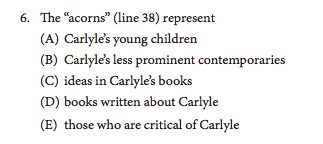
Type 6: Purpose of Part of the Text
Still other questions will ask you to identify what purpose a particular part of the text serves in the author's larger argument. What is the author trying to accomplish with the particular moment in the text identified in the question?
You can identify these questions because they will generally explicitly ask what purpose a certain part of the text serves. You may also see words or phrases like "serves to" or "function."
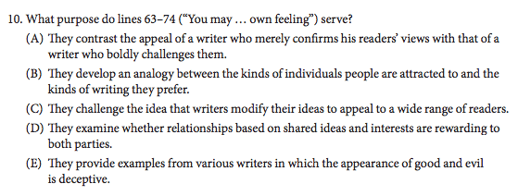
Type 7: Rhetorical Strategy
These questions will ask you to identify a rhetorical strategy used by the author. They will often specifically use the phrase "rhetorical strategy," although sometimes you will be able to identify them instead through the answer choices, which offer different rhetorical strategies as possibilities.
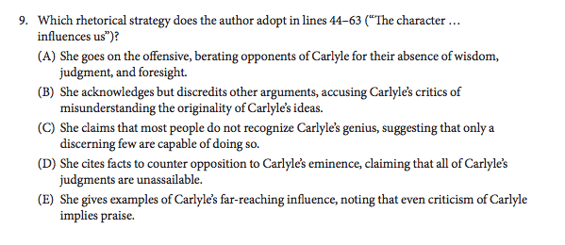
Type 8: Composition
This is the newest question type, first seen in the 2019/2020 school year. For these questions, the student will need to act as though they are the writer and think through different choices writers need to make when writing or revising text.
These questions can involve changing the order of sentences or paragraphs, adding or omitting information to strengthen an argument or improve clarity, making changes to draw reader attention, and other composition-based choices.
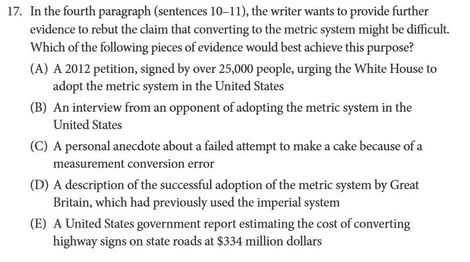
Some very important stylish effects going on here.
The AP English Language and Composition Free Response
The free response section has a 15-minute reading period. After that time, you will have 120 minutes to write three essays that address three distinct tasks.
Because the first essay involves reading sources, it is suggested that you use the entire 15-minute reading period to read the sources and plan the first essay. However, you may want to glance at the other questions during the reading period so that ideas can percolate in the back of your mind as you work on the first essay.
Essay One: Synthesis
For this essay, you will be briefly oriented on an issue and then given anywhere from six to seven sources that provide various perspectives and information on the issue. You will then need to write an argumentative essay with support from the documents.
If this sounds a lot like a DBQ , as on the history AP exams, that's because it is! However, this essay is much more argumentative in nature—your goal is to persuade, not merely interpret the documents.
Example (documents not included, see 2022 free response questions ):
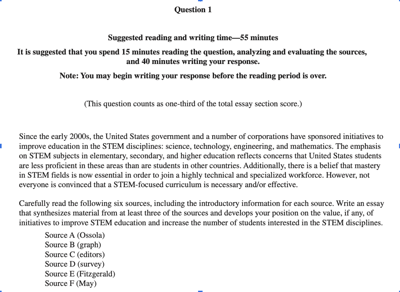
Essay Two: Rhetorical Analysis
In the second essay, you'll be presented with an excerpt from a nonfiction piece that advances an argument and asked to write an essay analyzing the rhetorical strategies used to construct the passage's argument. You will also be given some orienting information—where the passage was excerpted from, who wrote it, its approximate date, where it was published (if at all), and to whom it was directed.
Example (excerpt not included, see 2022 free response questions ):

Essay Three: Argument
In the third essay, you will be presented with an issue and asked to write a persuasive essay taking a position on the issue. You will need to support your position with evidence from your "reading, experience, and observations."
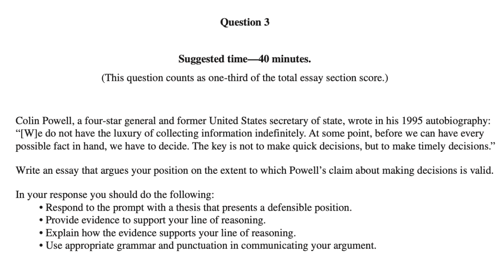
This doesn't look like a very well-constructed argument.
How The AP Language and Composition Exam Is Scored
The multiple-choice section of the exam is worth 45% of your score, and the free-response section is worth the other 55%. So each of the three free-response essays is worth about 18% of your score.
As on other APs, your raw score will be converted to a scaled score of 1-5. This exam has a relatively low 5 rate. Only 10% of test takers received a 5 in 2022 , although 56% of students received a score of 3 or higher.
In terms of how the raw score is obtained, the multiple-choice section is similar to other AP multiple-choice sections: you receive a point for every question you answer correctly, and there is no penalty for guessing.
The grading rubrics for the free-response questions were revamped in 2019. They are scored using analytic rubrics instead of holistic rubrics. For each free-response question, you will be given a score from 0-6. The rubrics assess three major areas:
#1: Thesis (0 to 1 points): Is there a thesis, and does it properly respond to the prompt?
#2: Evidence and Commentary (0 to 4 points): Does the essay include supporting evidence and analysis that is relevant, specific, well organized, and supports the thesis?
#3: Sophistication (0 to 1 points): Is the essay well-crafted and does it show a sufficiently nuanced understanding of the prompt?
Each scoring rubric broadly assesses these three factors. However, each task is also different in nature, so the rubrics do have some differences. I'll go over each rubric—and what it really means—for you here.
Synthesis Essay Rubrics
EVIDENCE AND COMMENTARY
SOPHISTICATION

Time to synthesize this dough into some cookies.
Rhetorical Analysis Essay Rubrics

Examine your texts closely!
Argumentative Essay Rubrics

The best kind of frenzy is a puppy frenzy!
AP English Language Prep Tips
Unlike its cousin, the AP English Literature and Composition exam, the AP Language and Composition exam (and course) have very little to do with fiction or poetry. So some students used to more traditional English classes may be somewhat at a loss as to what to do to prepare.
Luckily for you, I have a whole slate of preparation tips for you!
Read Nonfiction—In a Smart Way
A major thing you can do to prepare for the AP Lang and Comp exam is to read nonfiction— particularly nonfiction that argues a position , whether explicitly (like an op-ed) or implicitly (like many memoirs and personal essays). Read a variety of non-fiction genres and topics, and pay attention to the following:
- What is the author's argument?
- What evidence do they use to support their position?
- What rhetorical techniques and strategies do they use to build their argument?
- Are they persuasive? What counterarguments can you identify? Do they address them?
Thinking about these questions with all the reading you do will help you hone your rhetorical analysis skills.
Learn Rhetorical Terms and Strategies
Of course, if you're going to be analyzing the nonfiction works you read for their rhetorical techniques and strategies, you need to know what those are! You should learn a robust stable of rhetorical terms from your teacher, but here's my guide to the most important AP Language and Composition terms .
- We've compiled a list of 20 rhetorical devices you should know.
- A heroic individual from Riverside schools in Ohio uploaded this aggressively comprehensive list of rhetorical terms with examples. It's 27 pages long, and you definitely shouldn't expect to know all of these for the exam, but it's a useful resource for learning some new terms.
- Another great resource for learning about rhetorical analysis and how rhetorical devices are actually used is the YouTube Channel Teach Argument , which has videos rhetorically analyzing everything from Taylor Swift music videos to Super Bowl commercials. It's a fun way to think about rhetorical devices and get familiar with argumentative structures.
- Finally, a great book—which you might already use in your class—is " They Say, I Say. " This book provides an overview of rhetoric specifically for academic purposes, which will serve you well for AP preparation and beyond.
You also need to practice argumentative and persuasive writing. In particular, you should practice the writing styles that will be tested on the exam: synthesizing your own argument based on multiple outside sources, rhetorically analyzing another piece of writing in-depth, and creating a completely original argument based on your own evidence and experience.
You should be doing lots of writing assignments in your AP class to prepare, but thoughtful, additional writing will help. You don't necessarily need to turn all of the practice writing you do into polished pieces, either—just writing for yourself, while trying to address some of these tasks, will give you a low-pressure way to try out different rhetorical structures and argumentative moves, as well as practicing things like organization and developing your own writing style.

Not the most auspicious start to an argumentative essay.
Practice for the Exam
Finally, you'll need to practice specifically for the exam format. There are sample multiple-choice questions in the " AP Course and Exam Description ," and old free-response questions on the College Board website.
Unfortunately, the College Board hasn't officially released any complete exams from previous years for the AP English Language and Composition exam, but you might be able to find some that teachers have uploaded to school websites and so on by Googling "AP Language complete released exams." I also have a guide to AP Language and Composition practice tests .
Once you're prepped and ready to go, how can you do your best on the test?
Looking for help studying for your AP exam?
Our one-on-one online AP tutoring services can help you prepare for your AP exams. Get matched with a top tutor who got a high score on the exam you're studying for!

AP Language and Composition Test Day Tips
Here are four key tips for test-day success.

You are one hundred percent success!
Interact With the Text
When you are reading passages, both on the multiple-choice section and for the first two free-response questions, interact with the text! Mark it up for things that seem important, devices you notice, the author's argument, and anything else that seems important to the rhetorical construction of the text. This will help you engage with the text and make it easier to answer questions or write an essay about the passage.
Think About Every Text's Overarching Purpose and Argument
Similarly, with every passage you read, consider the author's overarching purpose and argument. If you can confidently figure out what the author's primary assertion is, it will be easier to trace how all of the other aspects of the text play into the author's main point.
Plan Your Essays
The single most important thing you can do for yourself on the free-response section of the AP English Language exam is to spend a few minutes planning and outlining your essays before you start to write them.
Unlike on some other exams, where the content is the most important aspect of the essay, on the AP Language Exam, organization, a well-developed argument, and strong evidence are all critical to strong essay scores. An outline will help you with all of these things. You'll be able to make sure each part of your argument is logical, has sufficient evidence, and that your paragraphs are arranged in a way that is clear and flows well.
Anticipate and Address Counterarguments
Another thing you can do to give your free responses an extra boost is to identify counterarguments to your position and address them within your essay. This not only helps shore up your own position, but it's also a fairly sophisticated move in a timed essay that will win you kudos with AP graders.

Address counterarguments properly or they might get returned to sender!
Key Takeaways
The AP Language and Composition exam tests your rhetorical skills. The exam has two sections.
The first section is an hour-long, 45 question multiple-choice test based on the rhetorical techniques and composition choices.
The second section is a two-hour free-response section (with a 15-minute initial reading period) with three essay questions: one where you must synthesize given sources to make an original argument, one where you must rhetorically analyze a given passage, and one where you must create a wholly original argument about an issue with no outside sources given.
You'll receive one point for every correct answer on the multiple-choice section of the exam, which is worth 45% of your score. The free-response section is worth 55% of your score. For each free-response question, you'll get a score based on a rubric from 0-6. Your total raw score will be converted to a scaled score from 1-5.
Here are some test prep strategies for AP Lang:
#1 : Read nonfiction with an eye for rhetoric #2 : Learn rhetorical strategies and techniques #3 : Practice writing to deploy rhetorical skills #4 : Practice for the exam!
Here are some test-day success tips:
#1 : Interact with each passage you encounter! #2 : Consider every text's overarching purpose and argument. #3 : Keep track of time #4 : Plan your essays #5 : Identify and address counterarguments in your essays.
With all of this knowledge, you're ready to slay the AP English Language and Composition beast!

Noble knight, prepare to slay the AP dragon!
What's Next?
Want more AP Lang review? We have a complete collection of released AP Language practice tests , as well as a list of the AP Lang terms you need to know and a guide to the multiple choice section .
Taking the AP Literature exam? Check out our ultimate guide to the AP English Literature test and our list of AP Literature practice tests .
Taking other AP exams? See our Ultimate Guides to AP World History , AP US History , AP Chemistry , AP Biology , AP World History , and AP Human Geography .
Need more AP prep guidance? Check out how to study for AP exams and how to find AP practice tests .

Want to build the best possible college application?
We can help. PrepScholar Admissions is the world's best admissions consulting service. We combine world-class admissions counselors with our data-driven, proprietary admissions strategies . We've overseen thousands of students get into their top choice schools , from state colleges to the Ivy League.
We know what kinds of students colleges want to admit. We want to get you admitted to your dream schools .
Learn more about PrepScholar Admissions to maximize your chance of getting in.

Ellen has extensive education mentorship experience and is deeply committed to helping students succeed in all areas of life. She received a BA from Harvard in Folklore and Mythology and is currently pursuing graduate studies at Columbia University.
Student and Parent Forum
Our new student and parent forum, at ExpertHub.PrepScholar.com , allow you to interact with your peers and the PrepScholar staff. See how other students and parents are navigating high school, college, and the college admissions process. Ask questions; get answers.

Ask a Question Below
Have any questions about this article or other topics? Ask below and we'll reply!
Improve With Our Famous Guides
- For All Students
The 5 Strategies You Must Be Using to Improve 160+ SAT Points
How to Get a Perfect 1600, by a Perfect Scorer
Series: How to Get 800 on Each SAT Section:
Score 800 on SAT Math
Score 800 on SAT Reading
Score 800 on SAT Writing
Series: How to Get to 600 on Each SAT Section:
Score 600 on SAT Math
Score 600 on SAT Reading
Score 600 on SAT Writing
Free Complete Official SAT Practice Tests
What SAT Target Score Should You Be Aiming For?
15 Strategies to Improve Your SAT Essay
The 5 Strategies You Must Be Using to Improve 4+ ACT Points
How to Get a Perfect 36 ACT, by a Perfect Scorer
Series: How to Get 36 on Each ACT Section:
36 on ACT English
36 on ACT Math
36 on ACT Reading
36 on ACT Science

Series: How to Get to 24 on Each ACT Section:
24 on ACT English
24 on ACT Math
24 on ACT Reading
24 on ACT Science
What ACT target score should you be aiming for?
ACT Vocabulary You Must Know
ACT Writing: 15 Tips to Raise Your Essay Score
How to Get Into Harvard and the Ivy League
How to Get a Perfect 4.0 GPA
How to Write an Amazing College Essay
What Exactly Are Colleges Looking For?
Is the ACT easier than the SAT? A Comprehensive Guide
Should you retake your SAT or ACT?
When should you take the SAT or ACT?
Stay Informed
Get the latest articles and test prep tips!
Looking for Graduate School Test Prep?
Check out our top-rated graduate blogs here:
GRE Online Prep Blog
GMAT Online Prep Blog
TOEFL Online Prep Blog
Holly R. "I am absolutely overjoyed and cannot thank you enough for helping me!”
Calculate for all schools
Your chance of acceptance, your chancing factors, extracurriculars, how to master the ap english language and composition rhetorical analysis essay.
Hey guys, I'm currently prepping for the AP English Language and Composition exam, and I'm having trouble with the rhetorical analysis essay. What are some tips and resources I should check out to help me ace this part of the exam? Thanks!
Hi there! Rhetorical analysis essays can be challenging, but with focused practice and a solid approach, you can do well on this section. Here are some tips and resources to help you:
1. Understand the rhetorical triangle: When analyzing a text, remember the rhetorical triangle, which consists of the author, audience, and purpose. Familiarize yourself with various rhetorical strategies authors use to engage with their audience and achieve their purpose.
2. Read and annotate: Take time to read and annotate the given passage, underlining or highlighting important rhetorical devices, transitions, and anything else that stands out to you. This will help you form the basis of your analysis.
3. Create an outline: Before writing your essay, jot down the main points you want to cover and organize them in a logical fashion. This will help ensure that your essay is well-structured, flows smoothly, and effectively covers the prompt.
4. Incorporate textual evidence: Always quote or paraphrase specific textual evidence to support your analysis. Don't simply state that rhetorical devices were used; show how they were used by referring to specific instances in the passage.
5. Use precise, concise language: Clearly articulate your analysis in a direct, concise manner. Use specific language and active verbs when analyzing the author's effectiveness.
6. Practice with past prompts: To get better at rhetorical analysis essays, practice by reviewing past AP exam prompts and analyzing various texts. This will help you build up your analytical skillset and familiarize yourself with the types of questions you might encounter.
- College Board's AP English Language and Composition Course and Exam Description (CED): This official College Board document provides a detailed breakdown of the course content, as well as sample exam questions and essays. You can find this on their website.
- CollegeVine: Their blog has multiple articles related to AP English Language and Composition that share tips, strategies, and advice to score well on the exam.
- AP Classroom: If your school has access to the College Board's AP Classroom, there are numerous resources available for practice, including sample essays and prompts.
- Review books: Many reputable companies publish review books specifically tailored to the AP English Language and Composition exam. These books often contain practice questions, summaries of rhetorical strategies, and tips for essay-writing.
About CollegeVine’s Expert FAQ
CollegeVine’s Q&A seeks to offer informed perspectives on commonly asked admissions questions. Every answer is refined and validated by our team of admissions experts to ensure it resonates with trusted knowledge in the field.
Get in touch with us
Are you sure you want to logout?
Study abroad.

AP Lang Rhetorical Analysis Essay
AP language exams are held for numerous subjects. Students have to choose a specific subject and get higher scores. The higher the score, the higher the chance of pursuing the best 700 colleges or universities overall in the world, including the United States and Canada.
When it comes to AP English language, it involves a section called rhetorical analysis essay. This is a part of three free-response essays that have to be answered within 2 hours and 15 minutes from the overall 3 hours 15 minutes exam.

If you are taking the AP Lang exam this year, guidance on how to answer this part will be useful. This article is specially curated to help you score the best. Read on to learn more about the AP language rhetorical analysis essay and get an idea of how to prepare for the associated exam successfully.
What is the AP Lang Rhetorical Analysis Essay ?
AP elaborated that the Advanced Placement is the exam conducted by the College Board in the United States of America. The exam is generally offered at the high school level and helps students to pursue higher education at the university level. The exam holds two sections: MCQs and Rhetorical Essay. MCQ sections are for 1 hour, and the rest of the time is for the essay section. The free-response essay holds three essays: rhetorical analysis essay, synthesis essay, and argumentative essay.

- The rhetorical analysis essay in the AP Lang exam involves students having to discuss how the authors’ contribution to the passage gives a theme or meaning.
- A synthesis essay involves students creating arguments on the passage or piece of information delivered to them.
- An argumentative essay requires students to pick a side ‘for or against ‘ for an argument or debate.
Since we are here to discuss rhetorical analysis essays in AP language, you must know the essay is added to test students’ ability to analyze and interpret the deeper meaning in the provided passage. Through rhetorical essays, the examiner examines how students connect with the author’s style of writing and syntax within 40 minutes. Some students may face challenges while dealing with this essay because it requires a better understanding of rhetorical strategies and the method to apply them.
Tips to Write a Rhetorical Analysis Essay AP Lang ?
Since a rhetorical essay is quite tricky in comparison to other essays, it requires certain tips for a better approach to answering. Let us explore the method of writing a rhetorical essay for the AP Lang exam that helps you score well.

- Outline Essay Prior to Writing
Not only good content but providing a readable structure is an important part of the rhetorical analysis essay AP Lang . First, you must read the passage thoroughly and develop a brief outline or key points before writing the essay. This helps you write with respect to the chronology of the given passage and maintain the flow of writing.
- Understand Rhetorical Strategies
You aren’t alone in thinking about where to start writing a rhetorical essay. Many students face the same and are required to learn and implement rhetorical strategies. First, understand what rhetoric actually means. It refers to language sensibly chosen and structured for an impressive effect on the audience. This involves persuasive appeal, logical fallacies, and syntax such as anaphora, anthesis, parallelism, and so on. There is a vast range of elements that you can assess in the provided essay and develop a strong grasp with consistent practice.

- Make your Essay Well-Structured
Sometimes, students understand the rhetorical strategies but still get confused about where to initiate. It is recommended to start with an introduction that delivers the purpose of your writing. In the last introductory line, you must talk about the rhetorical strategies you will discuss in the piece. However, there are so many styles, syntax, and tones. You must be specific while listing them and then move to develop a body paragraph.
Now, you have to collect all the rhetorical strategies you mentioned in the introduction to discuss your point of view chronologically. Be specific while discussing strategy, as only the crucial ones among them must be discussed. Never forget to cite the line from the original passage. Your write-up must maintain the flow and should include relativity among the paragraphs. End the rhetorical essay by summarising key points.

- Never Forget to Explain your Examples
Do not just state the examples or deliver statements like ‘this is an example of pathos or logos.’ It is advisable to explain the example you have listed in context to the rhetorical elements you have mentioned and how it aids the author in their viewpoint. Stay detailed yet precise while writing the rhetorical analysis essay AP Lang .
AP Lang Rhetorical Analysis Essay Rubric
Did you know that the rhetorical analysis essay AP Lang is graded into three rubric categories? Students must pay heed to the categories, as the examiner seeks specific things in each of them. Also, learn about some dos and don’ts to score well.

When it comes to grading the thesis of the rhetorical analysis essay AP Lang , there is nothing nebulous. Either you get one point, or you lose one. Thesis points help you get close to higher scores, and thus, you must be mindful of the following points.

- Developing an argument states that your interpretation leads to a risk of disagreement. Thus, your thesis statements must be in context with the author’s rhetorical choice.
- If you create a phrase in your mind initiating with ‘I think that..’, your phrase should not go in a negative argumentative direction.
- Never provide a thesis with summaries but not an argument.
- Try not to provide the thesis with repeated prompts.
Evidence is provided to prove the argumentative context in the thesis. This rubric category is graded from 0 to 4 points. To score higher, you must follow the points below.
- You must aim to provide multiple types of evidence in your argumentative thesis.
- Each statement you provide must be backed up with evidence in context to the text or arguments about the author’s theoretical choices.
- Add more and more evidence, which must be specific.
- Examine whether your evidence is linked with your overarching argument.
- Deliver your interpretation and never rely on just quotes or phrases.
- Steer clear of generalization for text or author
- Avoid quotes that speak for themselves. You must elaborate on the evidence you provided.
- Sophistication
According to The College Board, this category holds 0 to 1 points. The higher grading in rhetorical analysis essays indicates the delivery of the sophistication of thoughts or a complex understanding of rhetorical elements. In this, you have to mainly focus on the number of semicolons you use and not the fancy terms. Here is what you need to follow:
- Focus on delivering the right connection between the thesis and your evidence.
- Create a brief framework and then proceed with writing the essay in the right flow to stay precise and clear in your piece.
- Do not include arguments that you won’t be able to provide evidence for.
- Ignore complex or fancy words or phrases that are hard to follow.
Ways to Improve Your Rhetorical Analysis Essay AP Lang
Now that you know what a rhetorical analysis essay is and how it is developed, you must be thinking about how tricky it is to understand the passage. Many find themselves in a completely blank position when it comes to where to begin during the exam. They find the rhetorical analysis essay AP Lang quite challenging to deal with and understand the author’s perspective and viewpoint. Practicing rhetorical strategies does not help if you do not have the right approach, which only comes from the field experts and their guidance. Turito offers a platform where you get mentors to teach you all the concepts and approaches you apply in writing effective rhetorical essays in less time. Their course helps you get higher scores, which you can use to get college admission to your favorite college and country. Hey, you ambitious one, what are you waiting for? Contact us now and give your dreams a flight!
Frequently Asked Questions
What courses do turito offer.
Turito offers several courses to help you prepare. Here are some of them for your reference. 1. Foundation Course 2. IIT JEE 3. NEET 4. Study Abroad 5. Universal Program 6. PSAT 7. AP 8. IELTS
Can I ask queries on Turito?
Yes absolutely! Turito offers a platform where you can ask your concerns and queries. You will get answers from the field expert that can let your worries fade away.
Is Turito genuine?
Turito is students’ most trusted learning platform, among others. Turito believes in transparency and thus provides genuine feedback from students and parents on the official website. At Turito, we offer guaranteed success for hardworking students. Thus, there isn’t any negative feedback to hide. If you have any queries, you can write to us at [email protected]. Our experts will connect and assist you in no time.
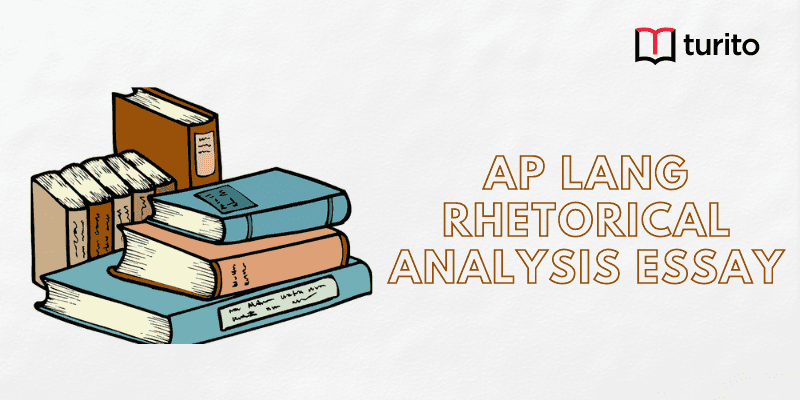
Relevant Articles

Steps to Draft AP Lang Synthesis Essay
The synthesis essay AP lang is part of the AP …
Steps to Draft AP Lang Synthesis Essay Read More »
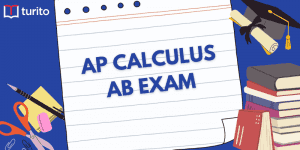
Strategies for Success: A Complete Overview of the AP Calculus AB Exam
The AP Calculus AB Exam serves as an important element …
Strategies for Success: A Complete Overview of the AP Calculus AB Exam Read More »

Preparing for Success: A Guide to the Features of Digital AP Exams
Digital Advanced Placement (AP) exams bring about a huge change …
Preparing for Success: A Guide to the Features of Digital AP Exams Read More »

With Turito Study Abroad

Get an Expert Advice from Turito

With Turito CAP.

With Turito Coding.

With Turito RoboNinja

1-on-1 tutoring for the undivided attention
Have a language expert improve your writing
Run a free plagiarism check in 10 minutes, generate accurate citations for free.
- Knowledge Base
- How to write a rhetorical analysis | Key concepts & examples
How to Write a Rhetorical Analysis | Key Concepts & Examples
Published on August 28, 2020 by Jack Caulfield . Revised on July 23, 2023.
A rhetorical analysis is a type of essay that looks at a text in terms of rhetoric. This means it is less concerned with what the author is saying than with how they say it: their goals, techniques, and appeals to the audience.
Instantly correct all language mistakes in your text
Upload your document to correct all your mistakes in minutes

Table of contents
Key concepts in rhetoric, analyzing the text, introducing your rhetorical analysis, the body: doing the analysis, concluding a rhetorical analysis, other interesting articles, frequently asked questions about rhetorical analysis.
Rhetoric, the art of effective speaking and writing, is a subject that trains you to look at texts, arguments and speeches in terms of how they are designed to persuade the audience. This section introduces a few of the key concepts of this field.
Appeals: Logos, ethos, pathos
Appeals are how the author convinces their audience. Three central appeals are discussed in rhetoric, established by the philosopher Aristotle and sometimes called the rhetorical triangle: logos, ethos, and pathos.
Logos , or the logical appeal, refers to the use of reasoned argument to persuade. This is the dominant approach in academic writing , where arguments are built up using reasoning and evidence.
Ethos , or the ethical appeal, involves the author presenting themselves as an authority on their subject. For example, someone making a moral argument might highlight their own morally admirable behavior; someone speaking about a technical subject might present themselves as an expert by mentioning their qualifications.
Pathos , or the pathetic appeal, evokes the audience’s emotions. This might involve speaking in a passionate way, employing vivid imagery, or trying to provoke anger, sympathy, or any other emotional response in the audience.
These three appeals are all treated as integral parts of rhetoric, and a given author may combine all three of them to convince their audience.
Text and context
In rhetoric, a text is not necessarily a piece of writing (though it may be this). A text is whatever piece of communication you are analyzing. This could be, for example, a speech, an advertisement, or a satirical image.
In these cases, your analysis would focus on more than just language—you might look at visual or sonic elements of the text too.
The context is everything surrounding the text: Who is the author (or speaker, designer, etc.)? Who is their (intended or actual) audience? When and where was the text produced, and for what purpose?
Looking at the context can help to inform your rhetorical analysis. For example, Martin Luther King, Jr.’s “I Have a Dream” speech has universal power, but the context of the civil rights movement is an important part of understanding why.
Claims, supports, and warrants
A piece of rhetoric is always making some sort of argument, whether it’s a very clearly defined and logical one (e.g. in a philosophy essay) or one that the reader has to infer (e.g. in a satirical article). These arguments are built up with claims, supports, and warrants.
A claim is the fact or idea the author wants to convince the reader of. An argument might center on a single claim, or be built up out of many. Claims are usually explicitly stated, but they may also just be implied in some kinds of text.
The author uses supports to back up each claim they make. These might range from hard evidence to emotional appeals—anything that is used to convince the reader to accept a claim.
The warrant is the logic or assumption that connects a support with a claim. Outside of quite formal argumentation, the warrant is often unstated—the author assumes their audience will understand the connection without it. But that doesn’t mean you can’t still explore the implicit warrant in these cases.
For example, look at the following statement:
We can see a claim and a support here, but the warrant is implicit. Here, the warrant is the assumption that more likeable candidates would have inspired greater turnout. We might be more or less convinced by the argument depending on whether we think this is a fair assumption.
Receive feedback on language, structure, and formatting
Professional editors proofread and edit your paper by focusing on:
- Academic style
- Vague sentences
- Style consistency
See an example

Rhetorical analysis isn’t a matter of choosing concepts in advance and applying them to a text. Instead, it starts with looking at the text in detail and asking the appropriate questions about how it works:
- What is the author’s purpose?
- Do they focus closely on their key claims, or do they discuss various topics?
- What tone do they take—angry or sympathetic? Personal or authoritative? Formal or informal?
- Who seems to be the intended audience? Is this audience likely to be successfully reached and convinced?
- What kinds of evidence are presented?
By asking these questions, you’ll discover the various rhetorical devices the text uses. Don’t feel that you have to cram in every rhetorical term you know—focus on those that are most important to the text.
The following sections show how to write the different parts of a rhetorical analysis.
Like all essays, a rhetorical analysis begins with an introduction . The introduction tells readers what text you’ll be discussing, provides relevant background information, and presents your thesis statement .
Hover over different parts of the example below to see how an introduction works.
Martin Luther King, Jr.’s “I Have a Dream” speech is widely regarded as one of the most important pieces of oratory in American history. Delivered in 1963 to thousands of civil rights activists outside the Lincoln Memorial in Washington, D.C., the speech has come to symbolize the spirit of the civil rights movement and even to function as a major part of the American national myth. This rhetorical analysis argues that King’s assumption of the prophetic voice, amplified by the historic size of his audience, creates a powerful sense of ethos that has retained its inspirational power over the years.
The body of your rhetorical analysis is where you’ll tackle the text directly. It’s often divided into three paragraphs, although it may be more in a longer essay.
Each paragraph should focus on a different element of the text, and they should all contribute to your overall argument for your thesis statement.
Hover over the example to explore how a typical body paragraph is constructed.
King’s speech is infused with prophetic language throughout. Even before the famous “dream” part of the speech, King’s language consistently strikes a prophetic tone. He refers to the Lincoln Memorial as a “hallowed spot” and speaks of rising “from the dark and desolate valley of segregation” to “make justice a reality for all of God’s children.” The assumption of this prophetic voice constitutes the text’s strongest ethical appeal; after linking himself with political figures like Lincoln and the Founding Fathers, King’s ethos adopts a distinctly religious tone, recalling Biblical prophets and preachers of change from across history. This adds significant force to his words; standing before an audience of hundreds of thousands, he states not just what the future should be, but what it will be: “The whirlwinds of revolt will continue to shake the foundations of our nation until the bright day of justice emerges.” This warning is almost apocalyptic in tone, though it concludes with the positive image of the “bright day of justice.” The power of King’s rhetoric thus stems not only from the pathos of his vision of a brighter future, but from the ethos of the prophetic voice he adopts in expressing this vision.
The conclusion of a rhetorical analysis wraps up the essay by restating the main argument and showing how it has been developed by your analysis. It may also try to link the text, and your analysis of it, with broader concerns.
Explore the example below to get a sense of the conclusion.
It is clear from this analysis that the effectiveness of King’s rhetoric stems less from the pathetic appeal of his utopian “dream” than it does from the ethos he carefully constructs to give force to his statements. By framing contemporary upheavals as part of a prophecy whose fulfillment will result in the better future he imagines, King ensures not only the effectiveness of his words in the moment but their continuing resonance today. Even if we have not yet achieved King’s dream, we cannot deny the role his words played in setting us on the path toward it.
If you want to know more about AI tools , college essays , or fallacies make sure to check out some of our other articles with explanations and examples or go directly to our tools!
- Ad hominem fallacy
- Post hoc fallacy
- Appeal to authority fallacy
- False cause fallacy
- Sunk cost fallacy
College essays
- Choosing Essay Topic
- Write a College Essay
- Write a Diversity Essay
- College Essay Format & Structure
- Comparing and Contrasting in an Essay
(AI) Tools
- Grammar Checker
- Paraphrasing Tool
- Text Summarizer
- AI Detector
- Plagiarism Checker
- Citation Generator
The goal of a rhetorical analysis is to explain the effect a piece of writing or oratory has on its audience, how successful it is, and the devices and appeals it uses to achieve its goals.
Unlike a standard argumentative essay , it’s less about taking a position on the arguments presented, and more about exploring how they are constructed.
The term “text” in a rhetorical analysis essay refers to whatever object you’re analyzing. It’s frequently a piece of writing or a speech, but it doesn’t have to be. For example, you could also treat an advertisement or political cartoon as a text.
Logos appeals to the audience’s reason, building up logical arguments . Ethos appeals to the speaker’s status or authority, making the audience more likely to trust them. Pathos appeals to the emotions, trying to make the audience feel angry or sympathetic, for example.
Collectively, these three appeals are sometimes called the rhetorical triangle . They are central to rhetorical analysis , though a piece of rhetoric might not necessarily use all of them.
In rhetorical analysis , a claim is something the author wants the audience to believe. A support is the evidence or appeal they use to convince the reader to believe the claim. A warrant is the (often implicit) assumption that links the support with the claim.
Cite this Scribbr article
If you want to cite this source, you can copy and paste the citation or click the “Cite this Scribbr article” button to automatically add the citation to our free Citation Generator.
Caulfield, J. (2023, July 23). How to Write a Rhetorical Analysis | Key Concepts & Examples. Scribbr. Retrieved April 1, 2024, from https://www.scribbr.com/academic-essay/rhetorical-analysis/
Is this article helpful?

Jack Caulfield
Other students also liked, how to write an argumentative essay | examples & tips, how to write a literary analysis essay | a step-by-step guide, comparing and contrasting in an essay | tips & examples, unlimited academic ai-proofreading.
✔ Document error-free in 5minutes ✔ Unlimited document corrections ✔ Specialized in correcting academic texts

AP® English Language
The ultimate guide to 2015 ap® english language frqs.
- The Albert Team
- Last Updated On: March 1, 2022

There were once two neighbors who lived in a small town on the edge of a roaring river. Their houses were set on piles of brick as a precaution for when the river would flood. The bricks had worked for a while, but they began to wear away over the years, and it had left the houses unstable.
One of the neighbors was always conscious of the fact that there could be another flood, so he spent countless hours building and fortifying the foundation of his house. He would get up early on the weekends and go to sleep late on the weeknights to rebuild his home the right way. While he was busy working, his neighbor would sleep in and go out at night, always commenting to his hard-working neighbor that there would be time for work later.
The hours he spent working resulted in a much stronger foundation. He eventually put the house on a set of sturdy stilts that would hold up against the power of a rushing river. He was never able to take his neighbor up on the offer to go out, but that spring when the waters of the river came rushing toward their houses, it all paid off. His house was left standing, while the flood destroyed his neighbor’s house.

Taking your AP® Language test puts you in the unique situation to choose your path. You can be like the man who put off preparing, going into the test blind. Or you can be like the man who spent long hours in preparation, making sure he was ready when the time came.
You want to be like the man who ensured his house had a stable foundation. The foundation you are building, though, will reflect the time you put into learning how to write stellar essays. That foundation includes learning about what the essays require, the best way to write them, and the scoring process. If you prepare yourself for the Free Response Questions, your writing will stand up to the flood, at least metaphorically.
Test Breakdown
The Free Response Questions (FRQs) are the essay portion of the AP® Language exam. The exam itself has two parts, the first is a multiple choice section, and the second is the FRQs. This guide provides an overview, strategies, and examples of the FRQs from the CollegeBoard. There is a guide to the multiple choice here .
The FRQ section has two distinct parts: 15 minutes for reading a set of texts and 120 minutes for writing three essays. The 15 minute “reading period” is designed to give you time to read through the documents for question 1 and develop a thoughtful response. Although you are advised to give each essay 40 minutes, there is no set amount of time for any of the essays. You may divide the 120 minutes however you want.
The three FRQs are each designed to test a different style of writing. The first question is always a synthesis essay – which is why they give you 15 minutes to read all of the sources you must synthesize. The second essay is rhetorical analysis, requiring you to analyze a text through your essay. The third paper is an argumentative essay.
Each essay is worth one-third of the total grade for the FRQ section, and the FRQ section is worth 55% of the total AP® test. Keep that in mind as you prepare for the exam, while the multiple-choice section is hard, the essays are worth more overall – so divide your study time evenly.
The scale for essay scores ranges from 1-9. A score of 1 being illegible or unintelligible, while a score of 9 is going to reflect the best attributes and aspects of early college level writing. You should be shooting to improve your scores to the passing range, which is 5 or above. Note that if you are struggling with the multiple choice section, a 9-9-9 on the essays can help make up for it.
The Tale of Three Essays
If you are currently taking an AP® class, you have probably experienced the style and formats of the three assignments. You may have learned about the specifics of the different types of essays in class, and you may have already found out which of the three is easiest for you. However, you must possess skill in all three to master the AP® test.
The First Essay (Synthesis)
The first essay on the test is going to be the synthesis essay . This essay can be the trickiest to master, but once you do get the hang of it, you will be one step closer to learning the others. The synthesis requires you to read six texts, which can be poems, articles, short stories, or even political cartoons.
Once you have read and analyzed the texts, you are asked to craft an argument using at least three of the documents from the set. The sources should be used to build and support your argument, and you must integrate them into a coherent whole.
On the 2015 FRQ section of the AP® exam, the synthesis essay focused on university honor codes. The complete prompt for the section is below:

If we break down the task it is asking you to use the six sources to create a “coherent, well-developed argument” from your own position on whether or not schools should create, maintain, change, or eliminate the honors system. As you read this you might have some experience with the idea of honor codes; perhaps you have one from your high school. You can use that experience, but your response needs to focus on the given texts.
To find the actual documents you can go here . Taking a look at the documents will provide some context for the essay samples and their scores.
The question is scored on a scale from 1-9, with nine being the highest. Let’s take a look at some examples of student essays, along with comments from the readers – to break down the dos and don’ts of the FRQ section.
You should always strive to get the highest score possible. Writing a high scoring paper involves learning some practices that will help you write the best possible synthesis essay. Below are three examples taken from student essays.
Craft a Well-Developed Thesis
One of the key elements of scoring high on the synthesis essay section of the FRQ is to craft a well-developed thesis that integrates three sources.
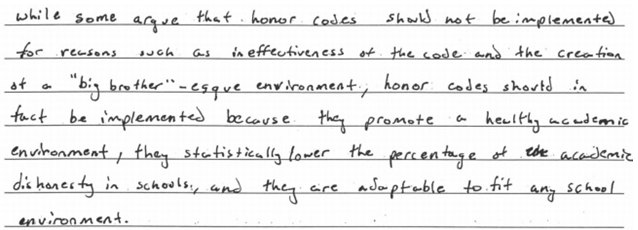
This thesis is from a high scoring essay based off of question 1 from the 2015 FRQ. Take note of some of the good things that this student is doing:
• The essay mentions three examples that they will reference throughout the rest of their essay: promotes a healthy academic environment, statistically lowers the percentage of academic dishonesty in school, and adaptability to school environments.
Part of a strong thesis is the use of three reasons to support the main claim. Each of the reasons that supports your claim should come from a different source text. By using a three-reason support of your claim, you ensure that you have at least the three required sources integrated. Remember : to get a 6 or higher requires 3 or more sources.
• The intro always introduces a counterclaim as a contrast to the thesis. The student points out that, “Some argue that honor codes should not be implemented for reasons such as ineffectiveness of the code and creation of a “big-brother”-esque environment…”
This counterclaim sets the student up to include a paragraph that argues against the claims posed in some of the articles, allowing them to use more of the given sources to their advantage. Using a counterclaim sets them up to write a well-supported essay.
Use Sources Effectively
Another essential part of scoring well on the synthesis essay is to utilize the sources effectively. The student demonstrates their command of the text through their second and third paragraphs:
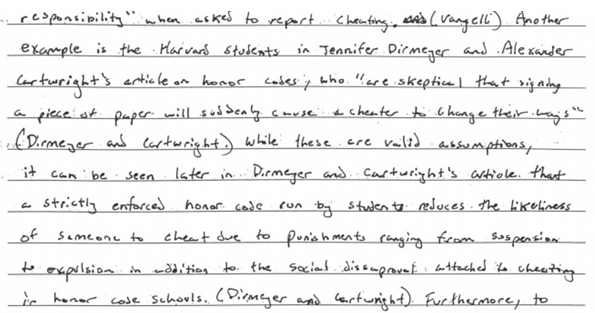
The student seamlessly integrates the different sources in their essay. Notice how in the section above the student can go from one source (Vangell) into information and argument based off of another source (Dirmeger and Cartwright). The ability to use the sources together to form a coherent and cohesive whole is one factor that can set your essay apart from other students’.
Have a Well-Developed Reason for Each Source
Lastly, you will want to ensure that you give a well-developed explanation of the texts when speaking about them. Take this for example:

The student demonstrates deep understanding, and it shows in their writing. You should read a range of texts to prepare for the test. In the example above the student demonstrates a few key skills:
• The student establishes that they understand that Bacall’s comic is satiric, and isn’t meant to seriously. The analysis shows the reader that the student understood the text, and was able to grasp the nuance of the satire.
• The student also establishes that the use of the spy cam is connected to a philosophical idea like totalitarianism – showing the student understands how the text relates to other parts of the world as a whole.
• The student uses the cartoon as a way to jump into his argument, showing how the fears of critics are unwarranted.
There are some practices that students should avoid on FRQ 1 of the test. Students who do these things can expect to receive low scores on their essays, and if you wish to score above a five, you should avoid them at all costs.
Don’t Change Your Argument Midway Through Your Essay.
Changing your argument creates confusion and will make your essay weaker overall. Let’s look at a few pieces from a student essay to see how they change their arguments midway through:

Notice that this student talks about the honor system at their school. The student say that it should be maintained in its current form because it is fair, but also punishes students. This statement is taken from the end of the intro paragraph and sets this up as the main crux of the student’s argument – with the idea that they will expand this idea in their paragraphs later.
However, they do not expand the argument with any evidence:
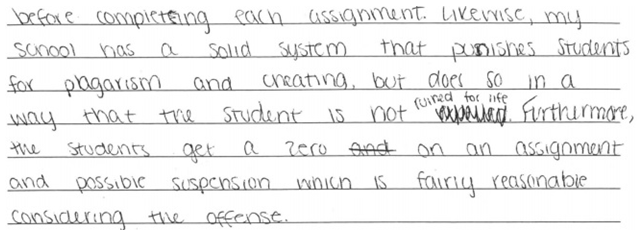
The student continues to talk about how the system at their school is stable, but at the same time, they offer no proof of the actual policy at their school. They use words like “possible” and “fairly” to describe the system – which seems to suggest they don’t have a good grasp of it.
Up to this point, the student has been somewhat consistent, despite being vague and offering no evidence to support the point about how their school’s honor code is a good example of an honor system that works. In the next paragraph, though, the student’s essay takes a complete turn:
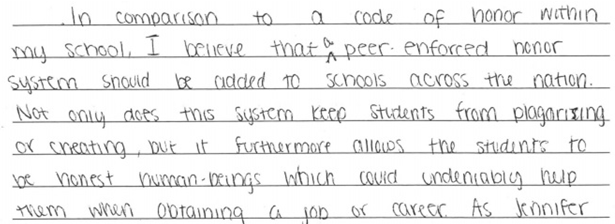
In their second to the last paragraph, the student turns from the idea that their school’s honor code is “solid” and instead state that they should change it to incorporate a peer-enforced honor system. This line of argument doesn’t go well with the rest of their essay and even acts to contradict their main points.
Most likely the student added this part to their paper after they realized that they had only utilized a single source. The essay ends with confusion and two sources used inadequately. The lesson to learn from this bad essay is that we should stay consistent in our arguments, sticking to the points we discuss at the beginning.
Don’t Fail to Argue the Prompt
One of the easiest ways to fail question one is to write an essay that doesn’t answer the task in the prompt. If we take a look at a sample of a student’s writing, we can see what it looks like when the aim of the essay isn’t focused on the prompt:
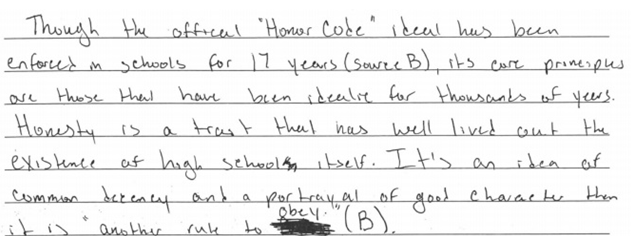
This student is not focusing on whether or not honor codes work. The student is instead giving information and background about honor codes. This explanation goes on for the entire introductory paragraph of the essay, but in the end, the reader has no idea what the student is going to say in the rest of the essay.
The use of information instead of argument is an ineffective strategy for the AP® Language exam, and you should avoid it. Don’t try to make the essay about something other than the assigned prompt. If you stick to the prompt, you will have a better shot at getting a high score like an 8 or 9.
AP® Readers’ Tips:
- Read every text before you start your essay. One of the pitfalls of many students is that they do not use enough sources and try to fit them in after the fact.
- Plan ahead. Ensure that you understand what you are going to be saying and how you will incorporate the different sources into your writing. You will need at least three sources to get above a 6, so ensure you have at least that many mapped in your plan.
The Second Essay (Rhetorical Analysis)
The second essay on the FRQ section is always a rhetorical analysis essay. This essay will focus on analyzing a text for an important aspect of the writing. In the case of the 2015 FRQ, the analysis was supposed to concentrate on rhetorical strategies:

The prompt asks the reader to carefully read the article written by Cesar Chavez and write an essay analyzing the rhetorical choices he uses in the article. Rhetorical choices are simply another term for rhetorical strategies and include things like the rhetorical appeals, and rhetorical devices.
Let’s examine the do’s and don’ts for the second essay.
Utilize Specific Examples from the Text in Your Analysis
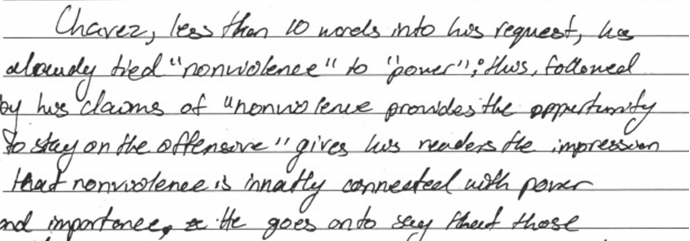
In this high scoring essay, the student goes into their analysis right away. The student points out that Chavez uses precise diction, a rhetorical device, to get his point across. This specific example shows the depth and understanding of the student’s analysis and sets the student up to receive a high score.
Whatever you identify in the text for your analysis, you should be able to point out precisely how it supports your main point. The more depth you can give in your analysis, the more accurate you can be with your comments, the better you will do.
Use Outside Knowledge Effectively to Strengthen Your Argument
The ability to pull in outside knowledge from your classes or books you have read will help enhance your analysis. Let’s take a look at how a student did this on the 2015 exam:

In the example above, the student can provide a more in-depth analysis of Chavez’s words by connecting Chavez’s mention of Gandhi to background knowledge of what Gandhi did in British-controlled India.
The student can provide a comparison of sorts and show how effective Chavez’s comparison is by offering background information about Gandhi’s efforts in India.
Whenever possible, bring in background information that will help with your analysis. It might only seem like extra knowledge about the topic or author, but it could provide some insight into why they chose to write about something or show the full effect of their argument.
Some things to avoid on the literary analysis essay include misreading the passage and providing inadequate analysis of the text.
Don’t Misread the Text
One of the easiest ways to lower your score is to explain something from the text that is incorrect. Let’s look at one of the examples of this from a student essay:

The article mentions that the farm workers union was inspired by the work of Martin Luther King Jr. The student’s misreading of the article led them to write, “Chavez’s appeal reached out to an audience of African-American working for justice and equality…” This analysis is a blatant misread of the passage because nowhere does it signify that Chavez was reaching out to African-Americans specifically.
This type of misread may seem minor, but it indicates that the student’s grasp of the article is less than what they need to analyze it in depth. It will also alert the reader to that fact, and they may look more closely for other signs of misunderstanding and shallow reading.
Don’t Over-simplify Your Points
You will want to ensure that your analysis is detailed and gets to the very root of the text. Here is an example of simple analysis from a student:
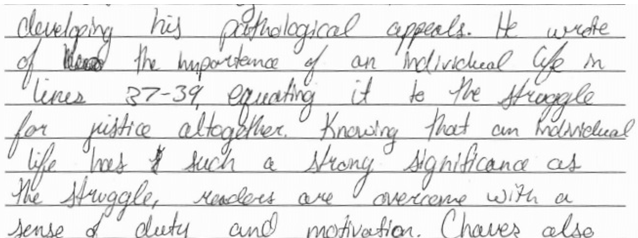
The student references lines from the text, but the student does not go into detail about what those lines say, nor does the student elaborate on why “…readers are overcome with a sense of duty and motivation.” This simplistic analysis of the text leaves a lot to be desired, and it received a low score because it didn’t provide the necessary details to analyze the text accurately.
You should elaborate on each piece of evidence that you bring forth from the text, and be specific about what in the text you are analyzing. The more you pay attention to the smaller details, the better your score will be in the long run.
AP® Readers’ Tips
- Pay attention to both the holistic (overall) and analytic (particular) views of the piece. You will need to understand both the text as a whole and the specific parts of the text to analyze it effectively.
- Don’t just analyze the rhetoric used, but instead connect the rhetoric to the specific purpose that Chavez hopes to achieve through his speech. This rule applies to any rhetorical analysis essay.
The Third Essay (Argument)
The third and last essay of the FRQ does not respond to a particular text. Instead, the prompt focuses on crafting an argument about a particular issue. Your essay will need to argue a particular position, though most of the questions put forth by the exam will not be simple either/or questions.
Let’s look at the prompt for the third essay from 2015:

Before we get into the do’s and don’ts of the essay, let’s talk about the particular challenge of this task. You are presented with a scenario, in this case, it deals with small talk, and you are asked to create an argument about that issue.
For 2015, the scenario asks you to argue what value or function you see in small or “polite” talk. You are asked to reference a culture or community you are familiar with, and use evidence from some sources.
A few of the most important things you can do to ensure you score well on the essay include clearly articulating your thesis and use every example to support your main claim.
Clearly Articulate Your Thesis
Like with the synthesis essay a clear thesis is important for the argumentative essay. The thesis should be clear in articulating the essay’s claim, and it should demonstrate that the student understood the requirements of the prompt. Let’s examine a well-written thesis statement:

The student, in this case, chose to argue that polite speech serves the purpose of making others more receptive to your purpose. The student then points out three specific situations where polite speech matters: when speaking to superiors, juries, and the general public.
At the end of the thesis statement, the student makes plain the exact nature of the exchange of polite speech for the desired goal. The clarity of their speech and the depth of their understanding is made clear by their command of language.
Use Examples to Support Main Claim
The best essays are going to use all of their examples to support their main claim. In the case of the third essay, the student sets the essay up so that every example will support the idea that polite speech works as an exchange between those with power and those seeking their purpose.
Let’s take a look at one example of how this support works:
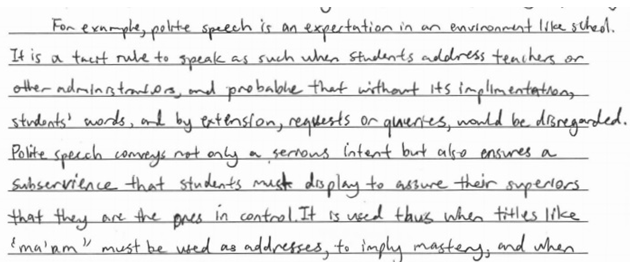
The student ensures that they are supporting their main claim. The student is very explicit in tying the example back to the claim with phrases like, “polite speech is an expectation in an environment like school”.
The student points out that there is an expectation of polite speech, and then shows what would happen if polite speech wasn’t used, “…without its implementation, students’ words, and by extension, requests or queries would be disregarded.” This evidence shows that not only is this type of speech required in a school setting but that it is what allows people to get what they want.
This passage demonstrates the level of depth and connection you must make from your evidence to your claim if you want to score well on the third essay of the FRQ. Keep the relationship in mind, and ensure that all your examples explicitly support your claim.
If we take a look at the essay samples from 2015, there are few examples that stand out as don’ts. In particular, you should avoid circular reasoning, and a failure to use variety in your sentences and writing.
Don’t be Unclear in Your Writing
When you are making an argument, and it is based solely on your experiences and reasoning, it can be easy to get bogged down in the details and fail to write a clear well-reasoned essay. You need to take your time and ensure you use clear, well-reasoned logic in your essay.
Let’s take a look at a sample from an essay that has circular reasoning:

The essay doesn’t have a clear, logical path. The thesis statement that polite speech is polite doesn’t add anything to the discussion of the value of polite speech. Their essay is set up by this reasoning to fail. You should avoid circular arguments and logical fallacies at all costs in your argumentative essay.
There is a three-part process to creating an argument and avoiding the mistakes from the sample above. Arguments have three main parts:
• Claim: What you are arguing is true.
• Warrant: Your explanation and reasoning for why it is true.
• Evidence: The proof that your warrant uses to prove your claim.
Without any of these three parts any argument is incomplete, and like the sample above – an argument that is incomplete will fail to earn you a high score.
Don’t use a Repetitive Sentence Structure
It seems simple, but many students use simple and repeated sentence structure. You don’t want your writing to become repetitive, so instead try to create variety. Let’s take a look at a student that used repetition too often:

Now the mistake this writer makes may have been done by accident, but it perfectly represents the problem of repetitive structure. It would be advised that you reread your essay before time is up to ensure that you don’t have any repetitions this obvious (In short…In short. above).
This problem can be solved by using a variety of sentence structures, lengths, and formations. You should work diligently as your practice to vary all the elements of your sentences and work to elevate the diction (word choice) you use to make it more formal and academic.
- Keep track of all parts of the prompt. One of the easiest ways to drop points is to forget to answer an important aspect of the prompt. In the case of the 2015 prompt, the essay needs to discuss both a community that is familiar with the student and the value of “polite” speech in that community.
- Try to reference literary examples in your writing. There wasn’t much opportunity to reference readings in the 2015 prompt, but if you can reference the different literature you have read as evidence, it can help boost your scores.
General AP® Readers’ Tips
• Make a plan. One of the best things you can do for any essay you are writing under a time crunch is make a thought-out plan. Sometimes, in the heat of writing, it is easy to forget where we are in our arguments. Having a simple outline can save you from that misfortune.
• Answer the question in your introduction, and be direct. Directly answering the prompt is one of the easiest ways to ensure you get a higher score.
• Clearly, indent your paragraphs, and ensure that you always have an easy to navigate structure. Topic sentences are a must, so make sure those figure into your structure.
• Use evidence especially quotes from the texts, and explain what they mean. You need to make an explicit connection between the evidence you use, and how it supports your points.
• Part of all great writing is variety. Vary your sentence structures, don’t make all of your sentences short or choppy, but instead try to inject some creativity into your writing. Utilize transitions, complex sentences, and elevated diction in your writing.
• Use active voice, and make every word add to the paper as a whole. Avoid fluff; you don’t want your paper to look bad because you are trying to pad your word count.
Wrapping up the Ultimate Guide to 2015 AP® English Language FRQs
Now that you better understand the expectations of the AP® Language and Composition FRQ section, you are one step closer to getting your five on the exam. Take what you have learned in this guide, and work on applying it to your writing. So, now it is time to go practice to perfection.
If you have any more tips or awesome ideas for how to study for the AP® Lang FRQ add them in the comments below.
Looking for AP® English Language practice?
Kickstart your AP® English Language prep with Albert. Start your AP® exam prep today .
Interested in a school license?
Popular posts.

AP® Score Calculators
Simulate how different MCQ and FRQ scores translate into AP® scores

AP® Review Guides
The ultimate review guides for AP® subjects to help you plan and structure your prep.

Core Subject Review Guides
Review the most important topics in Physics and Algebra 1 .

SAT® Score Calculator
See how scores on each section impacts your overall SAT® score

ACT® Score Calculator
See how scores on each section impacts your overall ACT® score

Grammar Review Hub
Comprehensive review of grammar skills

AP® Posters
Download updated posters summarizing the main topics and structure for each AP® exam.
Interested in a school license?

Bring Albert to your school and empower all teachers with the world's best question bank for: ➜ SAT® & ACT® ➜ AP® ➜ ELA, Math, Science, & Social Studies aligned to state standards ➜ State assessments Options for teachers, schools, and districts.
Rhetorical Analysis Essay
Rhetorical Analysis Essay Example
Rhetorical Analysis Essay Example - Free Samples
11 min read
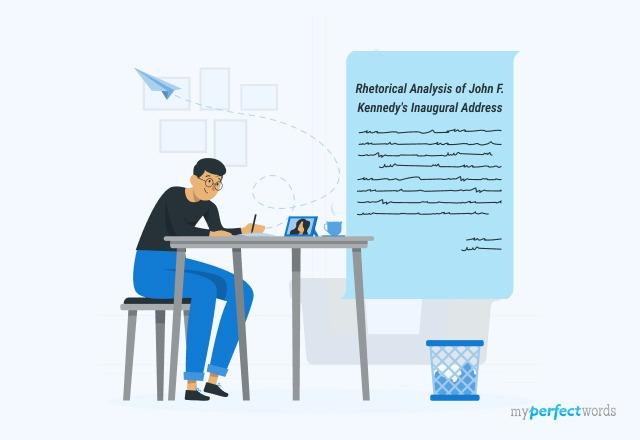
People also read
Rhetorical Analysis Essay - A Complete Guide With Examples
Rhetorical Analysis Essay Topics – 120+ Unique Ideas
Crafting an Effective Rhetorical Analysis Essay Outline - Free Samples!
Ethos, Pathos, and Logos - Structure, Usage & Examples
Writing a rhetorical analysis essay for academics can be really demanding for students. This type of paper requires high-level analyzing abilities and professional writing skills to be drafted effectively.
As this essay persuades the audience, it is essential to know how to take a strong stance and develop a thesis.
This article will find some examples that will help you with your rhetorical analysis essay writing effortlessly.
- 1. Good Rhetorical Analysis Essay Example
- 2. Rhetorical Analysis Essay Example AP Lang 2023
- 3. Rhetorical Analysis Essay Examples for Students
- 4. Writing a Visual Rhetorical Analysis Essay with Example
- 5. Rhetorical Analysis Essay Writing Tips
Good Rhetorical Analysis Essay Example
The step-by-step writing process of a rhetorical analysis essay is far more complicated than ordinary academic essays. This essay type critically analyzes the rhetorical means used to persuade the audience and their efficiency.
The example provided below is the best rhetorical analysis essay example:
Rhetorical Analysis Essay Sample
In this essay type, the author uses rhetorical approaches such as ethos, pathos, and logos . These approaches are then studied and analyzed deeply by the essay writers to weigh their effectiveness in delivering the message.
Let’s take a look at the following example to get a better idea;
The outline and structure of a rhetorical analysis essay are important.
According to the essay outline, the essay is divided into three sections:
- Introduction
- Ethos
- Logos
A rhetorical analysis essay outline is the same as the traditional one. The different parts of the rhetorical analysis essay are written in the following way:
Rhetorical Analysis Introduction Example
The introductory paragraph of a rhetorical analysis essay is written for the following purpose:
- To provide basic background information about the chosen author and the text.
- Identify the target audience of the essay.
An introduction for a rhetorical essay is drafted by:
- Stating an opening sentence known as the hook statement. This catchy sentence is prepared to grab the audience’s attention to the paper.
- After the opening sentence, the background information of the author and the original text are provided.
For example, a rhetorical analysis essay written by Lee Jennings on“The Right Stuff” by David Suzuki. Lee started the essay by providing the introduction in the following way:
Analysis of the Example:
- Suzuki stresses the importance of high school education. He prepares his readers for a proposal to make that education as valuable as possible.
- A rhetorical analysis can show how successful Suzuki was in using logos, pathos, and ethos. He had a strong ethos because of his reputation.
- He also used pathos to appeal to parents and educators. However, his use of logos could have been more successful.
- Here Jennings stated the background information about the text and highlighted the rhetorical techniques used and their effectiveness.
Thesis Statement Example for Rhetorical Analysis Essay
A thesis statement of a rhetorical analysis essay is the writer’s stance on the original text. It is the argument that a writer holds and proves it using the evidence from the original text.
A thesis statement for a rhetorical essay is written by analyzing the following elements of the original text:
- Diction - It refers to the author’s choice of words and the tone
- Imagery - The visual descriptive language that the author used in the content.
- Simile - The comparison of things and ideas
In Jennings's analysis of “The Right Stuff,” the thesis statement was:
Example For Rhetorical Analysis Thesis Statement
Rhetorical Analysis Body Paragraph Example
In the body paragraphs of your rhetorical analysis essay, you dissect the author's work, analyze their use of rhetorical techniques, and provide evidence to support your analysis.
Let's look at an example that analyzes the use of ethos in David Suzuki's essay:
Rhetorical Analysis Conclusion Example
All the body paragraphs lead the audience towards the conclusion.
For example, the conclusion of “The Right Stuff” is written in the following way by Jennings:
In the conclusion section, Jennings summarized the major points and restated the thesis statement to prove them.
Rhetorical Essay Example For The Right Stuff by David Suzuki
Rhetorical Analysis Essay Example AP Lang 2023
Writing a rhetorical analysis for the AP Language and Composition course can be challenging. So drafting it correctly is important to earn good grades.
To make your essay effective and winning, follow the tips provided by professionals below:
Step #1: Understand the Prompt
Understanding the prompt is the first thing to produce an influential rhetorical paper. It is mandatory for this academic writing to read and understand the prompt to know what the task demands from you.
Step #2: Stick to the Format
The content for the rhetorical analysis should be appropriately organized and structured. For this purpose, a proper outline is drafted.
The rhetorical analysis essay outline divides all the information into different sections, such as the introduction, body, and conclusion. The introduction should explicitly state the background information and the thesis statement.
All the body paragraphs should start with a topic sentence to convey a claim to the readers. Provide a thorough analysis of these claims in the paragraph to support your topic sentence.
Step #3: Use Rhetorical Elements to Form an Argument
Analyze the following things in the text to form an argument for your essay:
- Language (tone and words)
- Organizational structure
- Rhetorical Appeals ( ethos, pathos, and logos)
Once you have analyzed the rhetorical appeals and other devices like imagery and diction, you can form a strong thesis statement. The thesis statement will be the foundation on which your essay will be standing.
AP Language Rhetorical Essay Sample
AP Rhetorical Analysis Essay Template
Rhetorical Analysis Essay Example AP Lang
AP Lang Rhetorical Analysis Essay Example
Rhetorical Analysis Essay Examples for Students
Here are a few more examples to help the students write a rhetorical analysis essay:
Rhetorical Analysis Essay Example Ethos, Pathos, Logos
Rhetorical Analysis Essay Example Outline
Rhetorical Analysis Essay Example College
Rhetorical Analysis Essay Example APA Format
Compare and Contrast Rhetorical Analysis Essay Example
Comparative Rhetorical Analysis Essay Example
How to Start Rhetorical Analysis Essay Example
Rhetorical Analysis Essay Example High School
Rhetorical Analysis Essay Example APA Sample
Rhetorical Analysis Essay Example Of a Song
Florence Kelley Speech Rhetorical Analysis Essay Example
Rhetorical Analysis Essay Example MLA
Writing a Visual Rhetorical Analysis Essay with Example
The visual rhetorical analysis essay determines how pictures and images communicate messages and persuade the audience.
Usually, visual rhetorical analysis papers are written for advertisements. This is because they use strong images to convince the audience to behave in a certain way.
To draft a perfect visual rhetorical analysis essay, follow the tips below:
- Analyze the advertisement deeply and note every minor detail.
- Notice objects and colors used in the image to gather every detail.
- Determine the importance of the colors and objects and analyze why the advertiser chose the particular picture.
- See what you feel about the image.
- Consider the objective of the image. Identify the message that the image is portraying.
- Identify the targeted audience and how they respond to the picture.
An example is provided below to give students a better idea of the concept.
Simplicity Breeds Clarity Visual Rhetorical Analysis Essay Example
Rhetorical Analysis Essay Writing Tips
Follow the tips provided below to make your rhetorical writing compelling.
- Choose an engaging topic for your essay. The rhetorical analysis essay topic should be engaging to grab the reader’s attention.
- Thoroughly read the original text.
- Identify the SOAPSTone. From the text, determine the speaker, occasions, audience, purpose, subject, and tone.
- Develop a thesis statement to state your claim over the text.
- Draft a rhetorical analysis essay outline.
- Write an engaging essay introduction by giving a hook statement and background information. At the end of the introductory paragraph, state the thesis statement.
- The body paragraphs of the rhetorical essay should have a topic sentence. Also, in the paragraph, a thorough analysis should be presented.
- For writing a satisfactory rhetorical essay conclusion, restate the thesis statement and summarize the main points.
- Proofread your essay to check for mistakes in the content. Make your edits before submitting the draft.
Following the tips and the essay's correct writing procedure will guarantee success in your academics.
We have given you plenty of examples of a rhetorical analysis essay. But if you are still struggling to draft a great rhetorical analysis essay, it is suggested to take a professional’s help.
MyPerfectWords.com can assist you with all your academic assignments. The top essay writer service that we provide is reliable. If you are confused about your writing assignments and have difficulty meeting the deadline, get help from the legal essay writing service .
Hire our analytical essay writing service today at the most reasonable prices.

Write Essay Within 60 Seconds!

Nova Allison is a Digital Content Strategist with over eight years of experience. Nova has also worked as a technical and scientific writer. She is majorly involved in developing and reviewing online content plans that engage and resonate with audiences. Nova has a passion for writing that engages and informs her readers.

Paper Due? Why Suffer? That’s our Job!
Keep reading
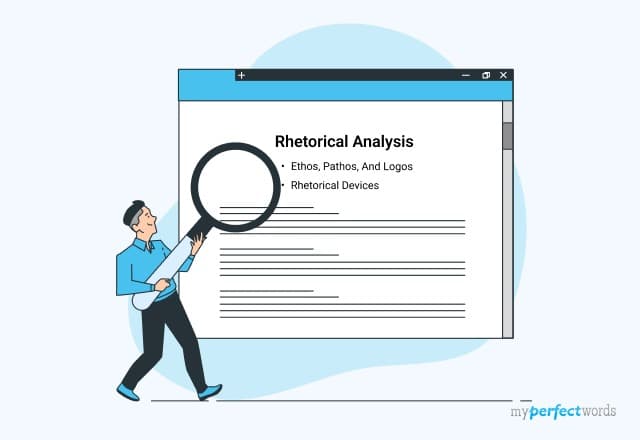

IMAGES
VIDEO
COMMENTS
The AP Lang Rhetorical Analysis Essay is one of three essays included in the written portion of the AP English Exam. The full AP English Exam is 3 hours and 15 minutes long, with the first 60 minutes dedicated to multiple-choice questions.
4. Be Sure to Explain Your Examples. As you write the essay, don't just list out your examples and say something like "this is an example of ethos, logos, pathos.". Instead, analyze how the example shows that rhetoric device and how it helps the author further their argument. As you write the rhetorical essay, you'll want to be as ...
Download free-response questions from past exams along with scoring guidelines, sample responses from exam takers, and scoring distributions. If you are using assistive technology and need help accessing these PDFs in another format, contact Services for Students with Disabilities at 212-713-8333 or by email at [email protected].
AP ELAC Name: _____ How to Write a RHETORICAL ANALYSIS ESSAY Step 1: Full Comprehension of the Text: I. SOAP Analysis of the Prompt - you begin by identifying each part (subject, occasion, etc.,) as much as you can from the PROMPT alone. You may add to your understanding as you read and analyze the passage.
Rhetorical Analysis Essay. : A rhetorical analysis essay is an essay that examines how an author uses language and persuasive techniques to convey their message and influence the audience. It analyzes the effectiveness of these strategies in achieving the author's purpose. 🏽 Exam Skills study guides written by former AP English Lang students ...
Download your free study guide pack for AP English Language here:https://marcolearning.com/free-study-guidesIn this video, John introduced you to the rhetori...
Rhetorical Analysis Question - Johnson. AP English Language and Composition Rhetorical Analysis Free-Response Question (2020) Sample Student Responses 1 Sample A [1] To this very day, hate surrounds us. It was no different in the twentieth century, with segregation and rampant wars prevalent. Citizens of all nations were being left behind in ...
AP English Language and Composition: Sample Argument Question. The following paragraph is adapted from Mirror for Man, a book written by anthropologist Clyde Kluckhorn in the middle of the twentieth century. Read the passage carefully. Then, write an essay that examines the extent to which the author's characterization of the United States ...
The essay becomes clear, assertive, and easy to follow for the examiners. Follow this rhetorical essay strategy and you are even closer to getting that 5 on the exam. Rhetorical Essay Strategy #3: LORA. As you are looking at your AP® English Language rhetorical essay prompt and passage it is important to remember the mnemonic device, LORA.
Resources you need to improve your Rhetorical Analysis essay on the AP English Language and Composition exam. Includes revelant readings and practice problems. Note: For best results, click to highlight and copy/paste this list into your Fiveable Rooms Task Card to automatically create individual tasks. Jumpstart your studying in 5 seconds!
Section II: Free Response. 3 Questions | 2 hours 15 minutes (includes a 15-minute reading period | 55% of Exam Score. Students write essays that respond to 3 free-response prompts from the following categories: Synthesis Question: After reading 6-7 texts about a topic (including visual and quantitative sources), students will compose an ...
The AP English Language and Composition Multiple-Choice. The multiple-choice section tests you on two main areas. The first is how well you can read and understand nonfiction passages for their use of rhetorical devices and tools. The second is how well you can "think like a writer" and make revisions to texts in composition questions.
Hi there! Rhetorical analysis essays can be challenging, but with focused practice and a solid approach, you can do well on this section. Here are some tips and resources to help you: 1. Understand the rhetorical triangle: When analyzing a text, remember the rhetorical triangle, which consists of the author, audience, and purpose.
When it comes to AP English language, it involves a section called rhetorical analysis essay. This is a part of three free-response essays that have to be answered within 2 hours and 15 minutes from the overall 3 hours 15 minutes exam. If you are taking the AP Lang exam this year, guidance on how to answer this part will be useful.
Revised on July 23, 2023. A rhetorical analysis is a type of essay that looks at a text in terms of rhetoric. This means it is less concerned with what the author is saying than with how they say it: their goals, techniques, and appeals to the audience. A rhetorical analysis is structured similarly to other essays: an introduction presenting ...
The prose generally conveys the student's ideas but may be inconsistent in controlling the elements of effective writing. Question 2 (continued) 3 - Essays earning a score of 3 meet the criteria for the score of 4 but demonstrate less success in analyzing the rhetorical strategies that Thatcher uses to convey her message.
11%-14% 2. Rhetorical Situation: Writing Make strategic choices in a text to address a rhetorical situation. 11%-14% 3. Claims and Evidence: Reading Identify and describe the claims and evidence of an argument. 13%-16% 4. Claims and Evidence: Writing Analyze and select evidence to develop and refine a claim. 11%-14% 5.
Final drafts of essays will be scored holistically by AP English 11 students in other sections of the course (anonymity will be maintained through the use of student ID numbers in place of names). Scorers will use modified scoring criteria from the AP exam's rhetorical analysis essay.
Test Breakdown. The Free Response Questions (FRQs) are the essay portion of the AP® Language exam. The exam itself has two parts, the first is a multiple choice section, and the second is the FRQs. This guide provides an overview, strategies, and examples of the FRQs from the CollegeBoard. There is a guide to the multiple choice here.
The prose generally conveys the writer's ideas but may be inconsistent in controlling the elements of effective writing. Question 2 (continued) 3 - Essays earning a score of 3 meet the criteria for the score of 4 but demonstrate less success in analyzing the rhetorical choices Chavez makes to develop his argument about nonviolent resistance.
AP English Language Scoring Rubric, Free-Response Question 1-3 | SG 1 Scoring Rubric for Question 1: Synthesis Essay 6 points Reporting Category Scoring Criteria Row A Thesis (0-1 points) 4.B 0 points For any of the following: • There is no defensible thesis. • The intended thesis only restates the prompt.
Step #2: Stick to the Format. The content for the rhetorical analysis should be appropriately organized and structured. For this purpose, a proper outline is drafted. The rhetorical analysis essay outline divides all the information into different sections, such as the introduction, body, and conclusion.
AP English Language and Composition Rhetorical Analysis Free-Response Question (2020) Sample Student Responses 1 Sample A [1] Many Americans admired Kennedy and his administration when he was in the White House. He was a loved man. Many share in fond memories of Kennedy up until his death, when the nation grieved for him.